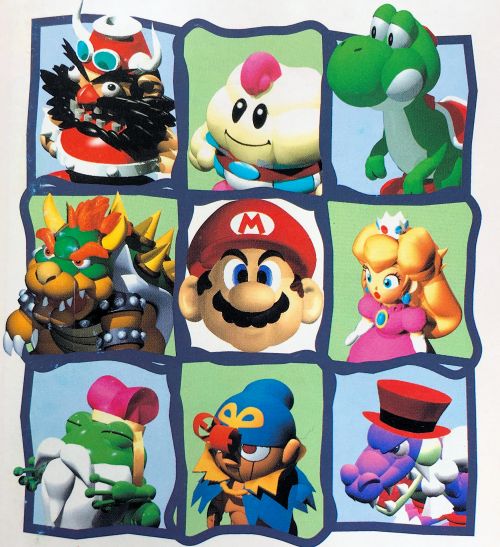
These Japanese messages are brimming with Japanese anime, manga, and music references from the 1980s and 1990s – especially from around the time the Japanese game was being developed.
What are all these Japanese references? How did they get handled in translation? And why is happiness hip? Let’s take a look!
Nokohei / Terrapin
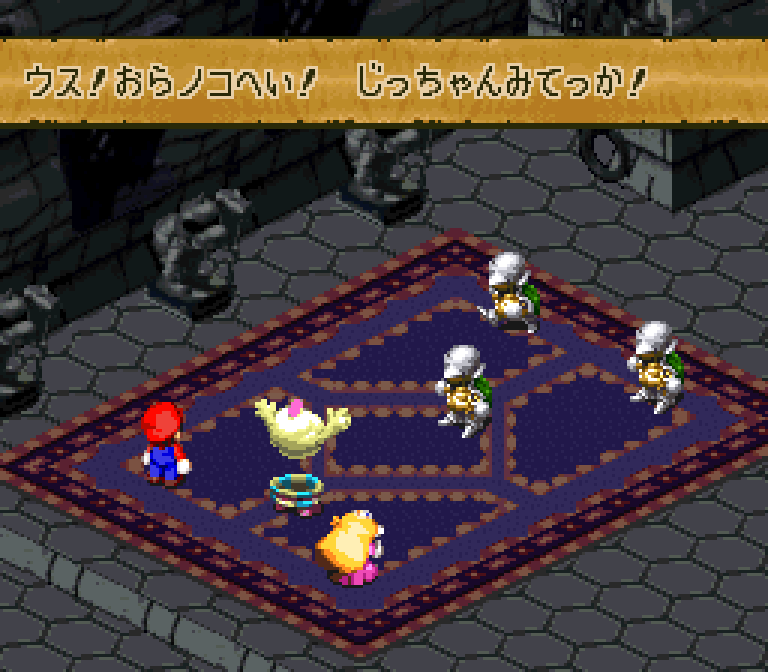 | 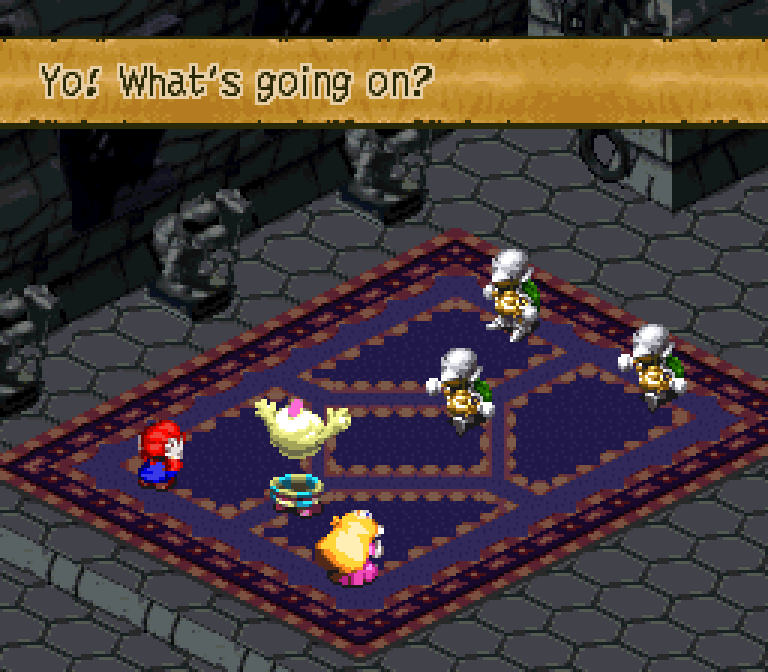 |
| "Yo, I'm Nokohei! Are you watching, Grandpa?!" | "Yo! What's going on?" |
This enemy’s message is a reference to Goku from the Dragon Ball series.
The first half of the quote is from an iconic line that plays at the end of every episode, just with the enemy’s name in place of Goku’s name. The second half is a reference to Goku’s dead grandfather, who Goku originally thinks has turned into a Dragon Ball.
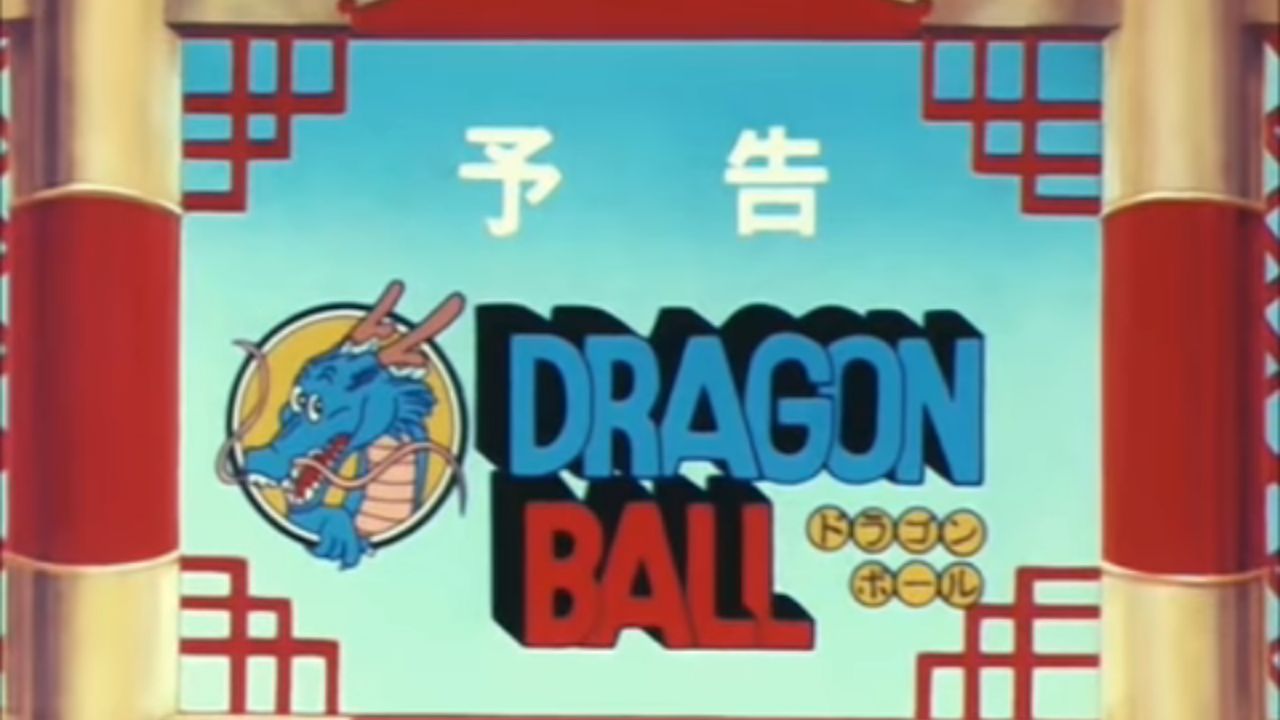
The English Super Mario RPG quote appears to be a basic greeting that’s based on the first half of the Japanese line, but it doesn’t retain the reference or replace it with a different one.
Incidentally, I don’t think it’s possible to see this message via normal gameplay, because you lose access to Bowser’s castle well before you gain the ability to read enemy’s thoughts.
Hammer Bros.
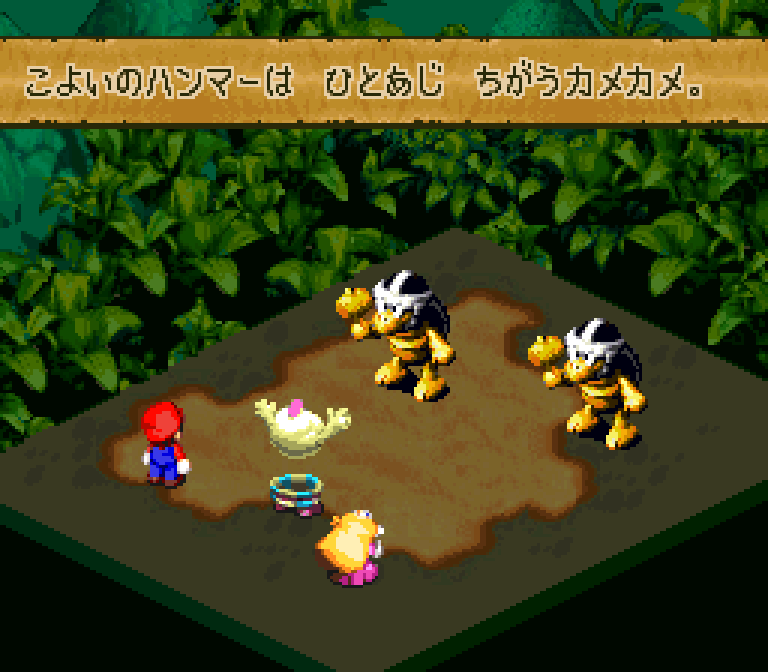 | 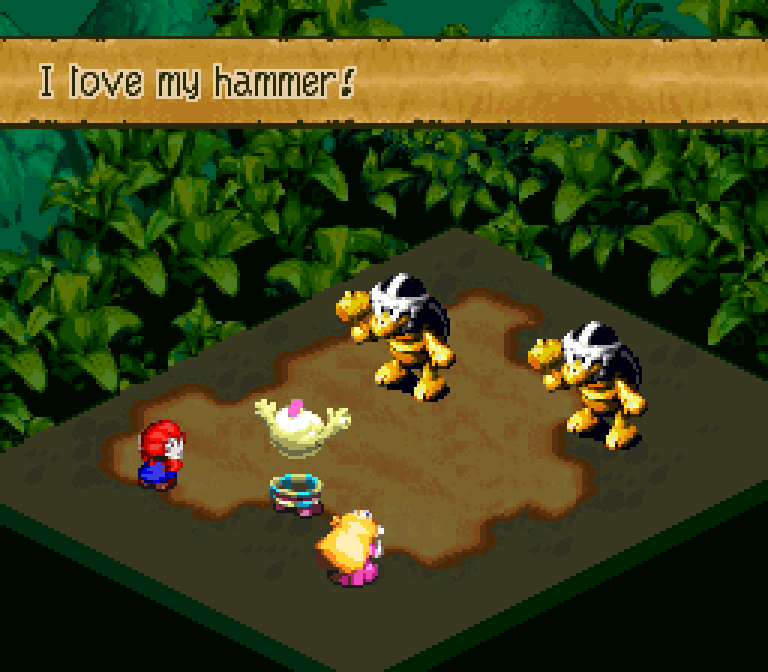 |
| "My hammer tonight is a little bit different, turtle-turtle." | "I love my hammer!" |
This Japanese enemy message is a play on a phrase that Goemon from the Lupin III series sometimes says: “My Zantetsuken tonight is a little bit different.”
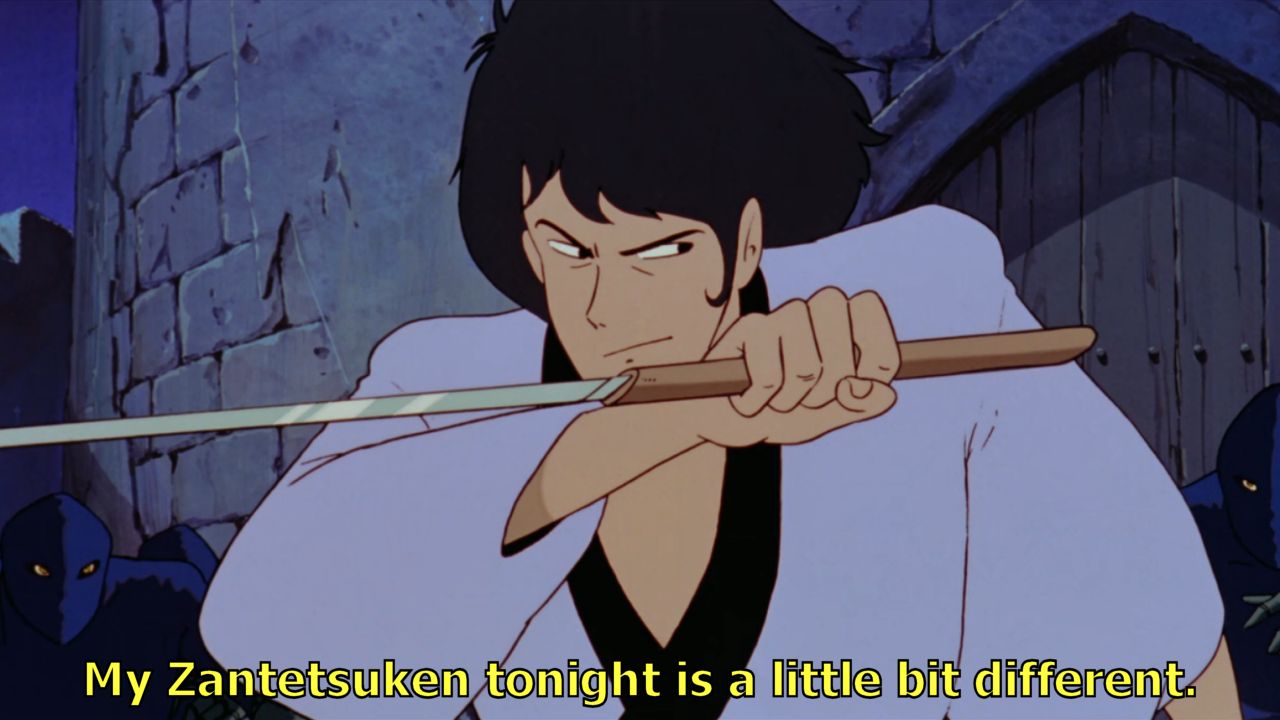
The English version of Super Mario RPG changes this enemy’s line into a basic statement: “I love my hammer!”. The full translation wouldn’t have fit or been easily recognized, of course, but I feel like there was so much missed potential here. Even something as simple as “It’s HAMMER TIME!” might’ve worked.
Shadow
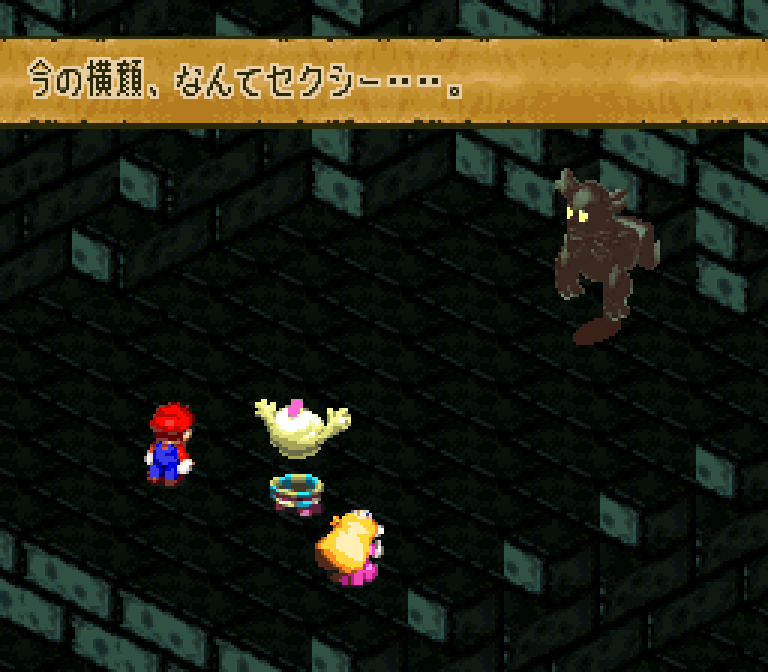 | 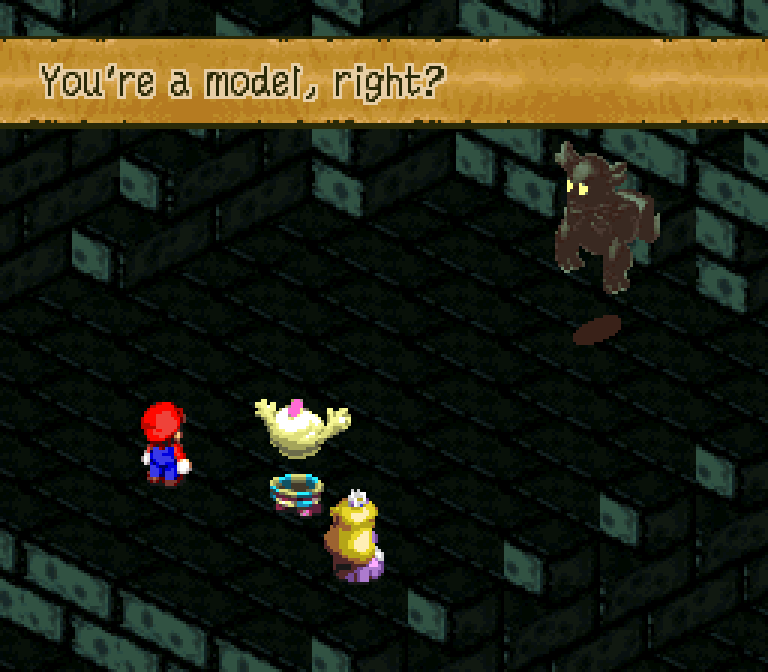 |
| "How sexy your side profile is right now..." | "You're a model, right?" |
This Japanese enemy message is a direct quote from Akira Terao’s 1980 song, “Shadow City”. My guess is that someone on the Japanese writing team saw that this enemy’s name was “Shadow” and then just chose the first shadow-related pop culture reference that came to mind.

The English version of Super Mario RPG changes this line to “You’re a model, right?”. It’s clear that the translator understood the Japanese text, but didn’t understand the significance of the line. I don’t recall if the word “sexy” was a problem for Nintendo of America at the time, but if so, that might be why the line changed.
Chūtarō / Rat Funk
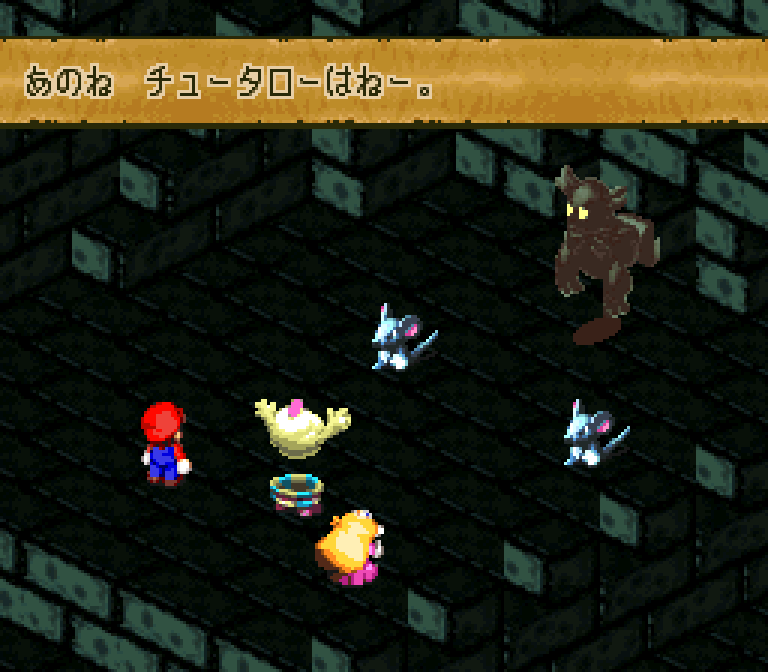 | 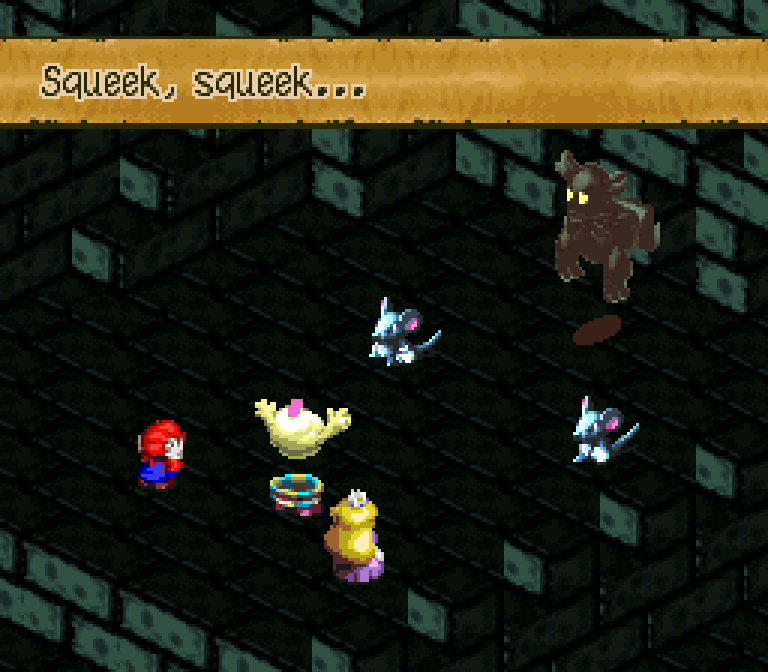 |
| "Hey, know what? Chūtarō has..." | "Squeek, squeek..." |
This Japanese enemy message is a reference to the opening lyrics to Shin Obake no Q-tarō’s theme song, just with the enemy’s name, “Chūtarō”, in place of “Q-tarō”.

Without context, this enemy’s Japanese message seems almost meaningless and incomplete. In the end, the translator simply made the enemy go “squeek, squeek”.
Pachīru / Crook
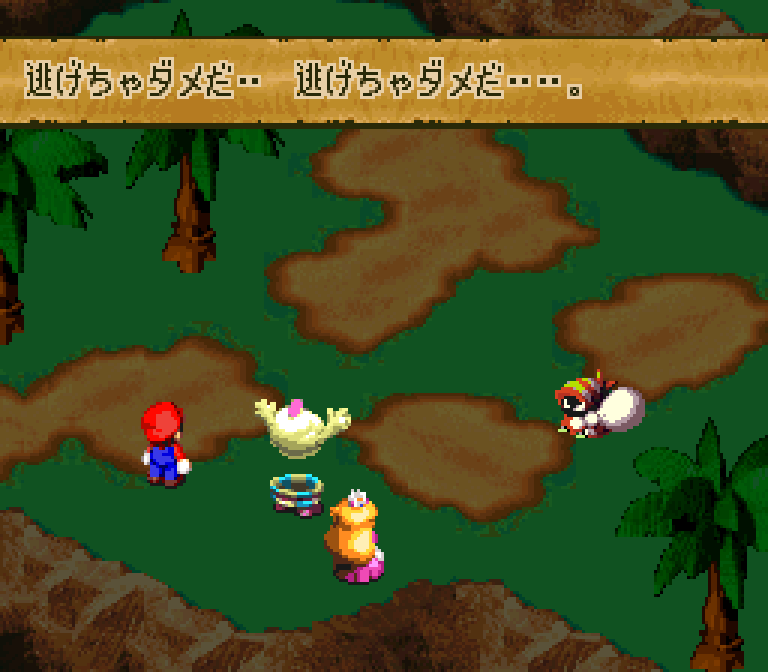 | 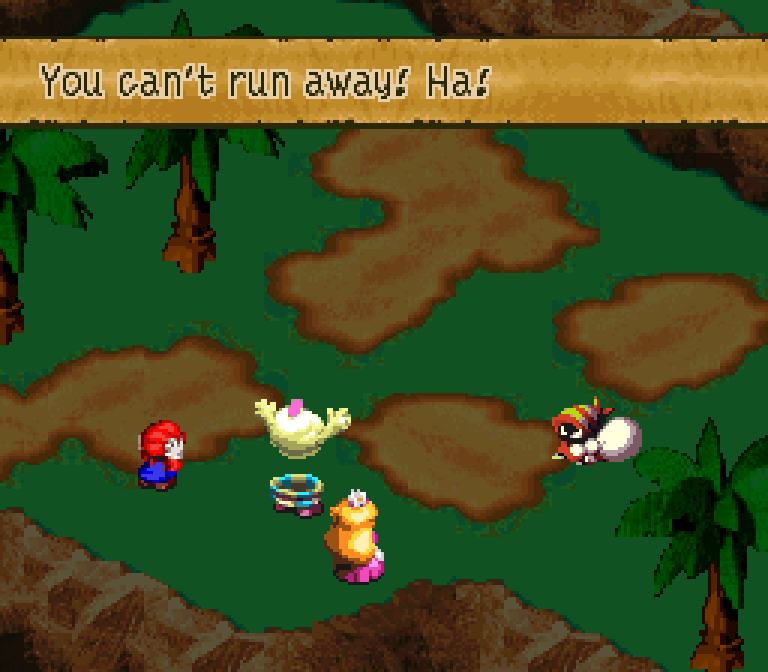 |
| "Mustn't run away... Mustn't run away..." | "You can't run away! Ha!" |
This Japanese enemy message is a quote from Neon Genesis Evangelion, specifically the iconic scene in Episode 1 in which Shinji tells himself over and over that he mustn’t run away:
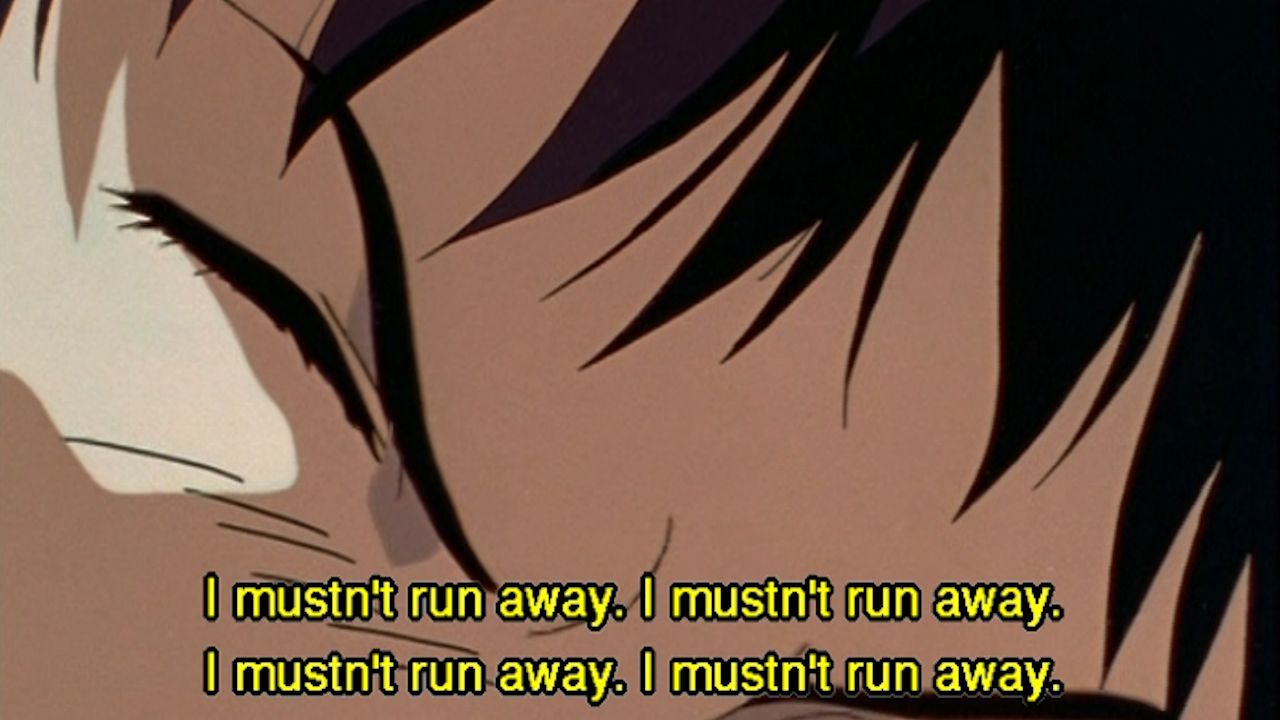
The Super Mario RPG translator seemed to understand the content of the Japanese line, but not the significance behind it. This is why the translation talks about not running away, but it’s now a comment directed at or about the player: “You can’t run away! Ha!”.
Dosokī Yung / Guerilla
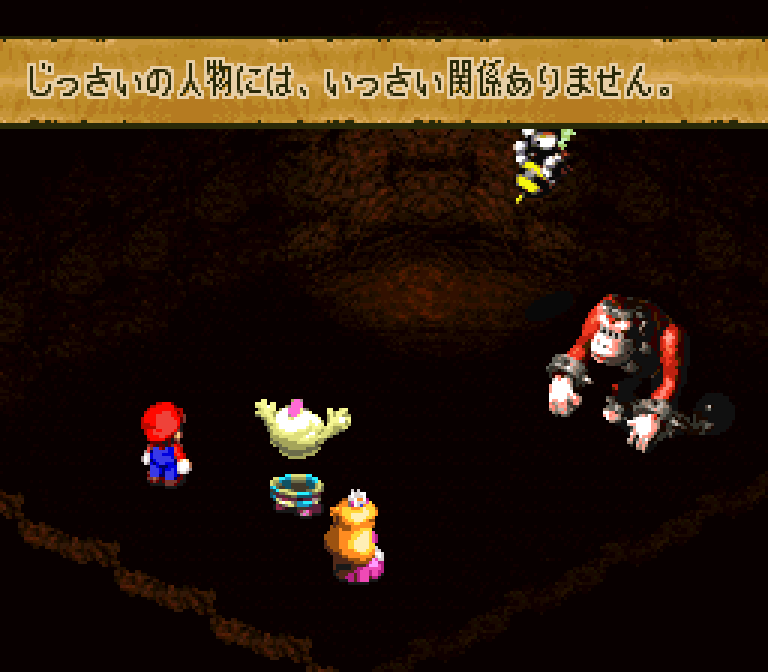 |  |
| "This character has no relation to any persons, living or dead. Any resemblance is purely coincidental." | "Don't confuse me with someone else!" |
In Japanese, this Donkey Kong-esque enemy is named ドソキーユング (Dosokī Yungu). The joke is that the name looks like a fake, bootleg version of Donkey Kong’s actual name: ドンキーコング (Donkī Kongu). The enemy’s message continues this joke by featuring a stock legal disclaimer.
The English enemy was changed to “Guerilla” – as opposed to “Gorilla” – as a way to keep the original intent intact. Due to text length limitations, the enemy’s legal disclaimer was dropped and replaced with something that still conveyed the joke.
Dauto / Jester
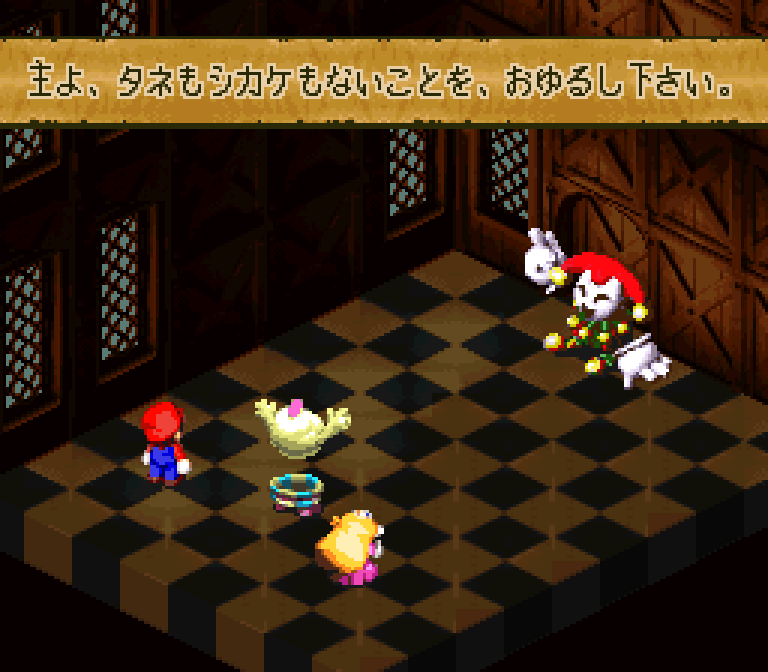 | 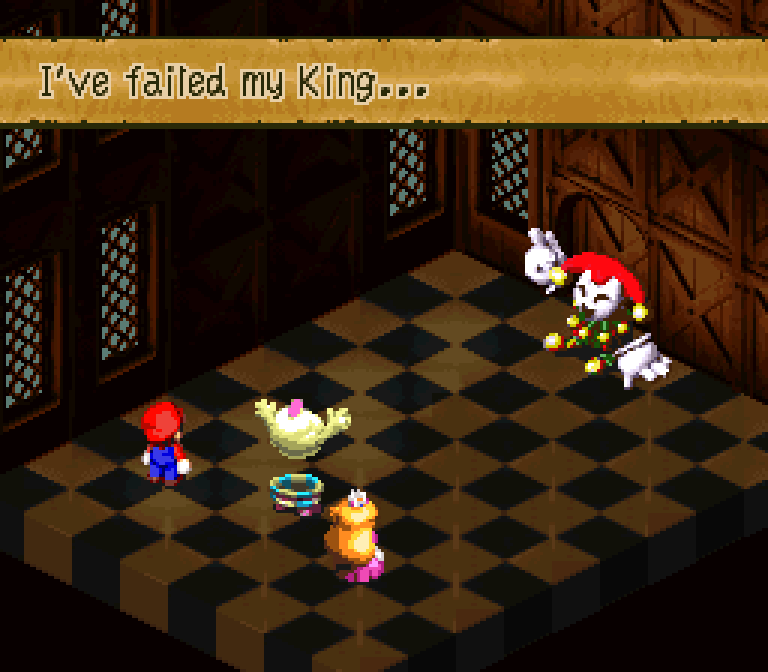 |
| "O Lord, please forgive me, for I use neither gimmick nor trick." | "I've failed my King..." |
This Japanese enemy message is a direct quote of the main character’s transformation line in the Saint Tail manga and anime series. Saint Tail premiered in 1995, right during Super Mario RPG’s development, so this is another example of how the Japanese game serves as a weird little pop culture time capsule from the era.
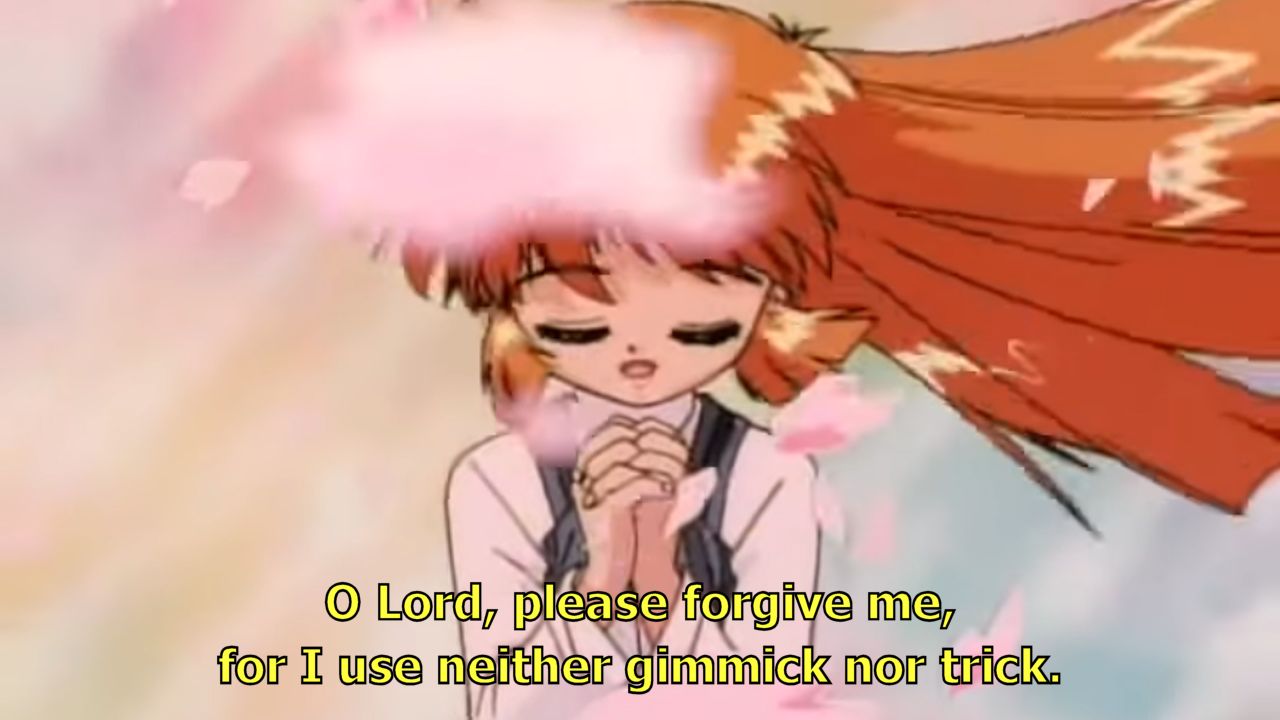
The Super Mario RPG translator didn’t seem aware of the reference, but understood that the quote was talking about a lord and was asking for forgiveness. The resulting translation became “I’ve failed my King…”.
From the Japanese wording, it’s pretty clear that it’s a religious line in nature, so my guess is that “Lord” was changed to “King” in order to better match the enemy’s jester appearance, or because “Lord” potentially went against Nintendo of America’s content policies in the 1990s. Either way, the English line appears to be a straightforward line and not a reference to anything.
Older Clown Brother / Knife Guy
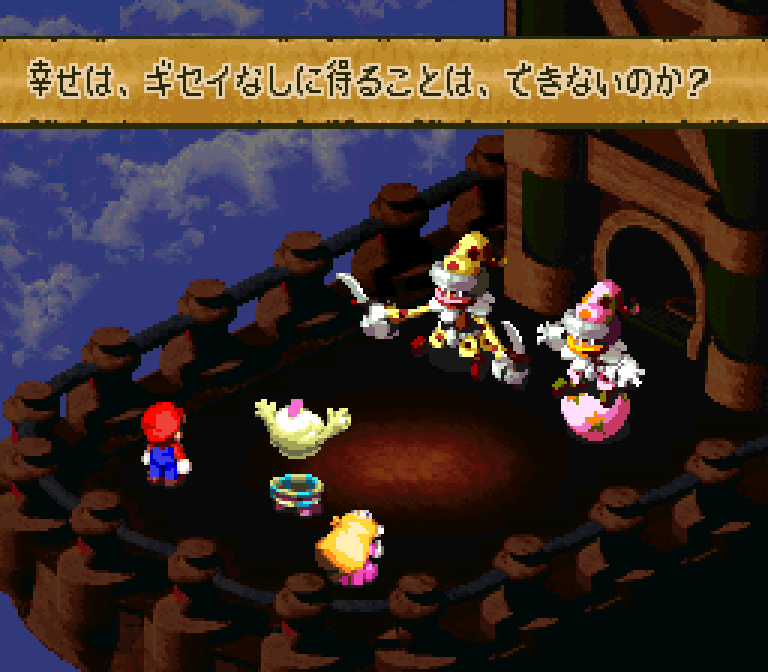 | 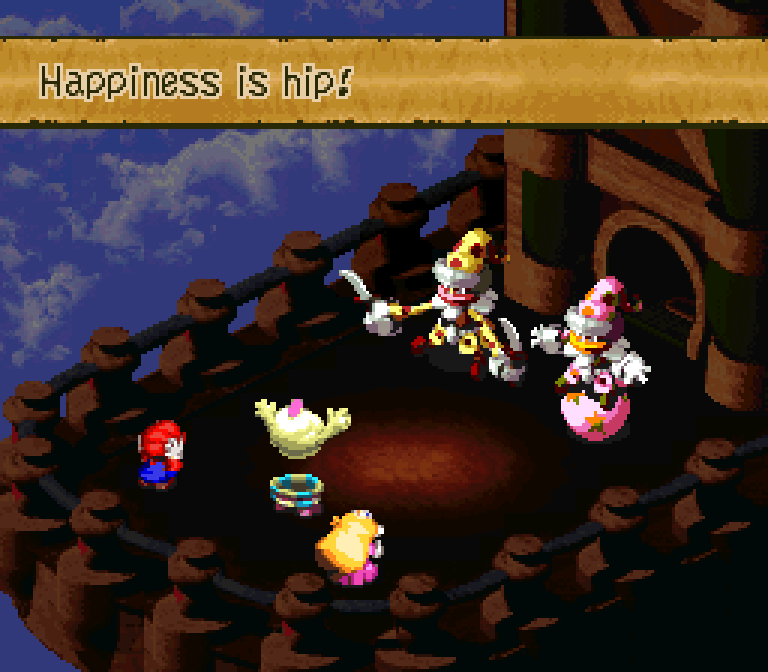 |
| "Can happiness be obtained without sacrifice?" | "Happiness is hip!" |
This Japanese enemy message is a direct quote taken from Giant Robo: The Day the Earth Stood Still, which debuted in 1992 and continued until 1998. Dr. Kusama, as he dies, asks his son this deep question. This short quote is probably one of the most iconic lines in the series.
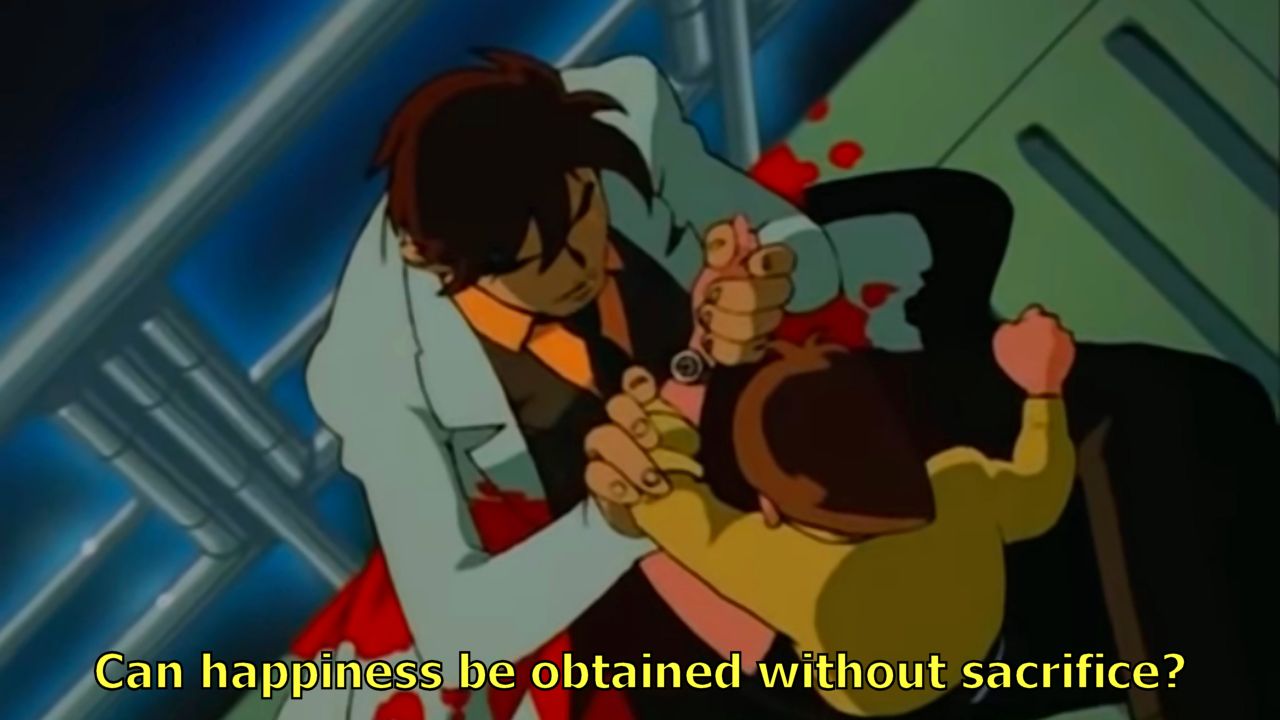
The Super Mario RPG translator likely wasn’t aware of the anime reference, but still understood that the line was about happiness in general. The resulting translation changed the somber, philosophical line into the bouncier “Happiness is hip!”.
Younger Clown Brother / Grate Guy
 | 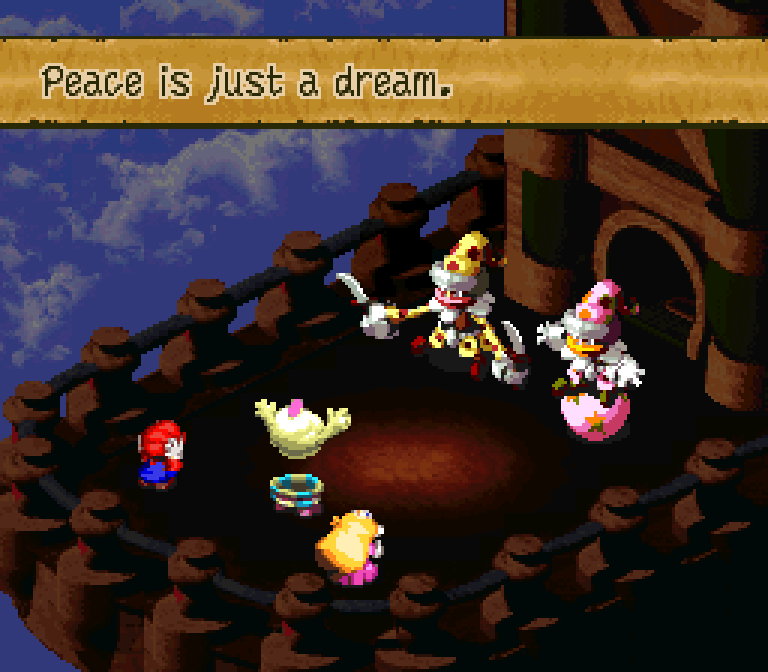 |
| "Can a new era be achieved without tragedy?" | "Peace is just a dream." |
This Japanese enemy message is also a quote from Giant Robo: The Day the Earth Stood Still. In fact, it’s the very next line that Dr. Kasuma asks his son as he’s dying.
Again, I don’t think the English translator recognized this anime reference, but did understand that the line was about misfortune. The resulting translation became “Peace is just a dream.”.
Mukumuku
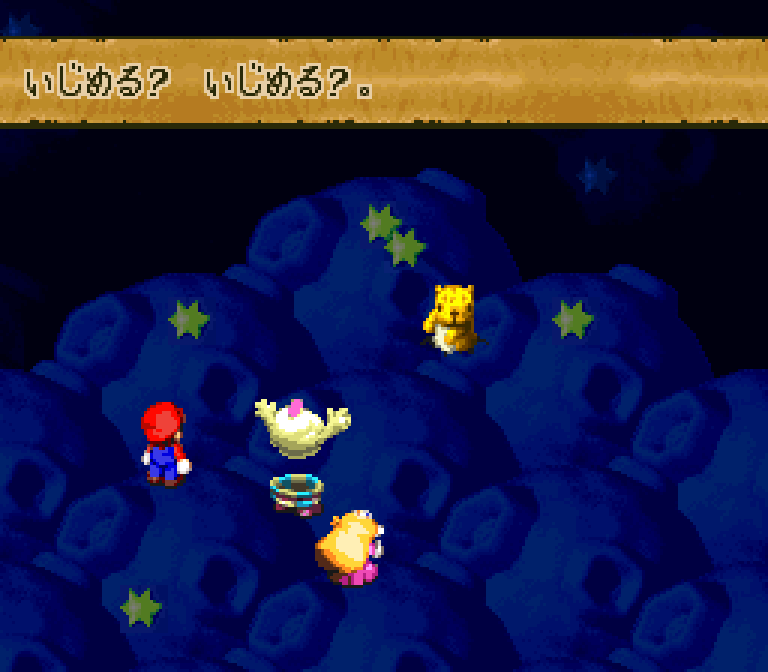 | 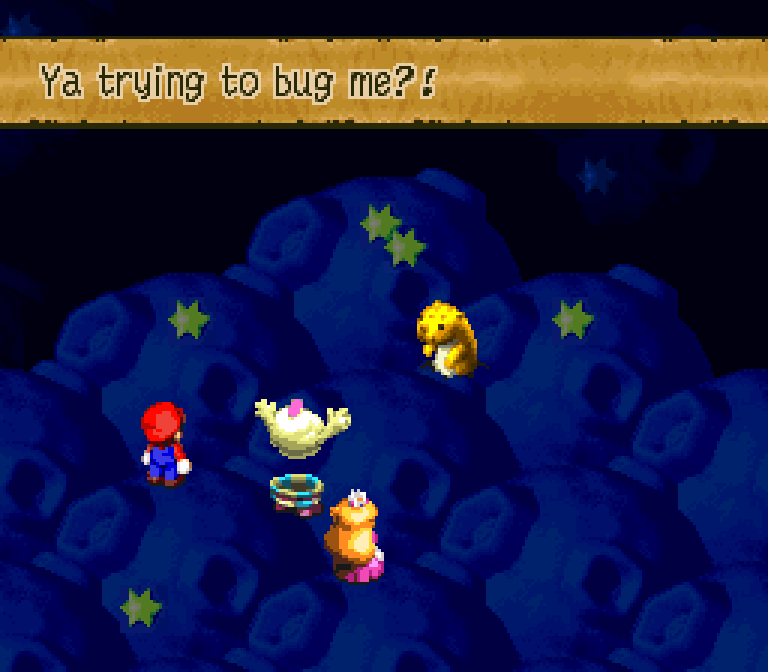 |
| "Bullying? Bullying?" | "Ya trying to bug me?!" |
This Japanese enemy message is a reference to the Bonobono manga and anime series – more specifically, the famous catchphrase that Shimarisu-kun says all the time early on in the series.
Bonobono debuted in 1995, which puts it right around the time that Super Mario RPG was being developed, and right around the time the catchphrase took off.
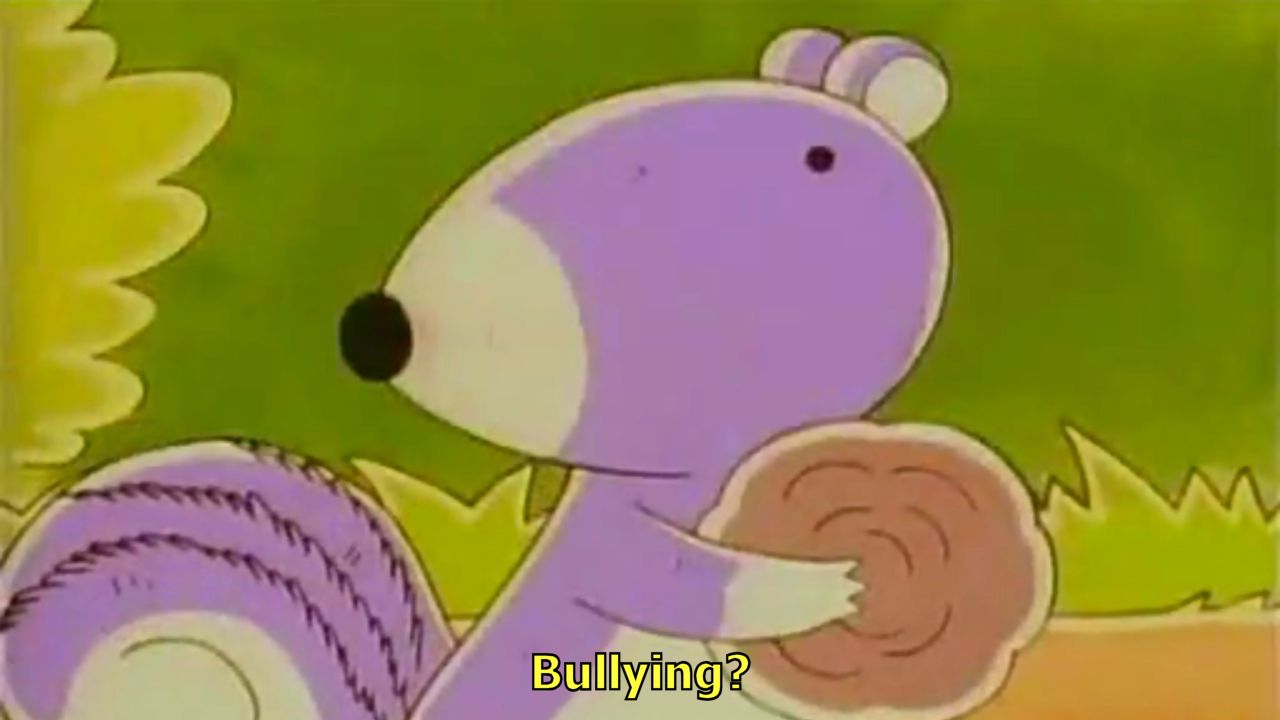
As we can see, the Mukumuku enemy in Super Mario RPG looks a bit like Shimarisu-kun, so it seems the developers played off of that and inserted the reference as a fun gag for players to laugh at.
The English translator didn’t seem to catch the reference, but understood what the text was saying.
The Japanese phrase used here, ijimeru, can mean things like “bullying” or “teasing” or “harassing”. This is why the quote was translated as “Ya trying to bug me?!” in English, but I’d be surprised if more than a handful of English-speaking players understood why this enemy was given this text.
Leon / Gecko
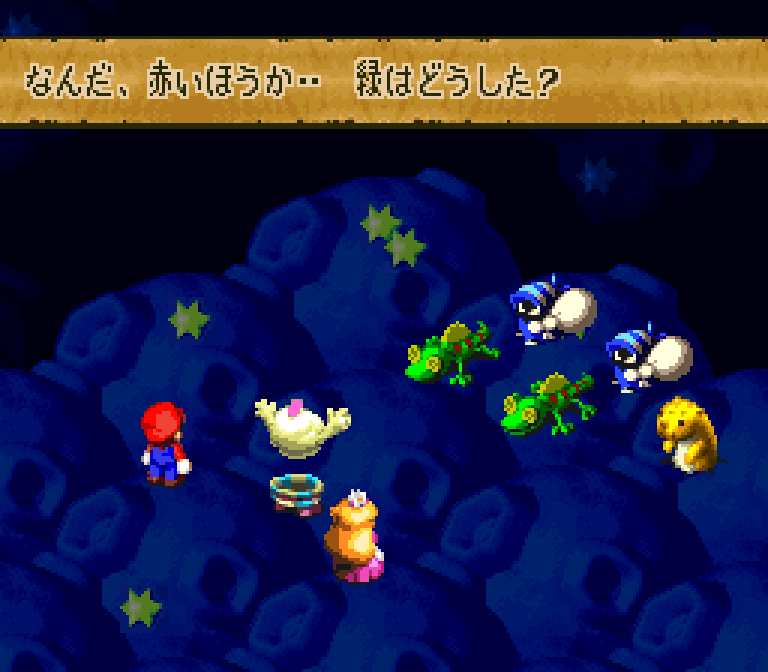 | 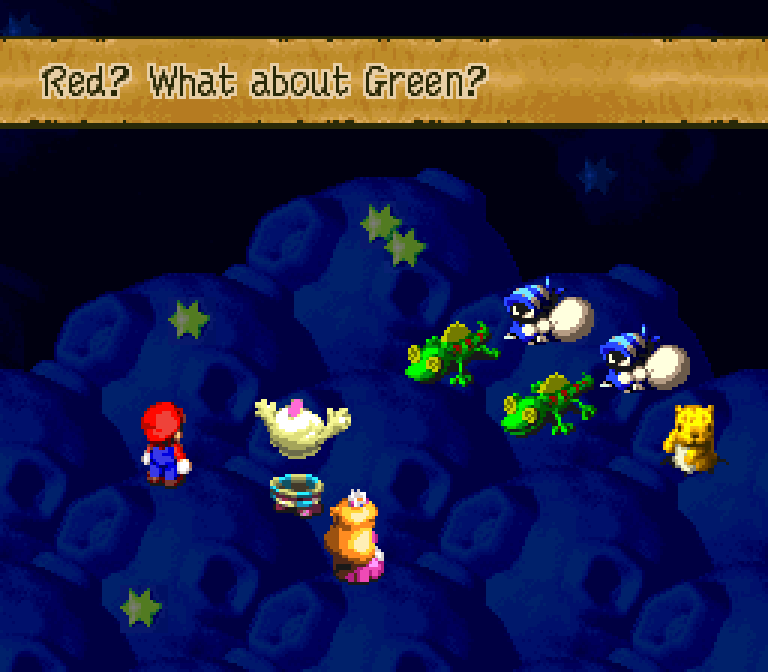 |
| "Oh, you're just the red one. Where's the green guy?" | "Red? What about Green?" |
This Japanese enemy message is an obvious reference to Luigi. The English translator recognized it and left the reference intact.
I wasn’t going to list this enemy message at first, but given that almost every other reference so far has been missed in translation, it seemed noteworthy to include.
Rupī / Pulsar
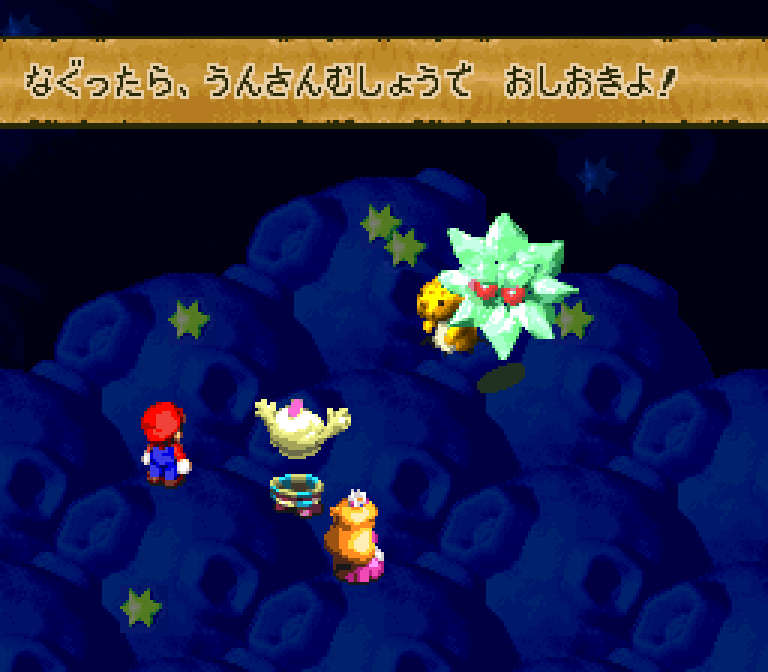 | 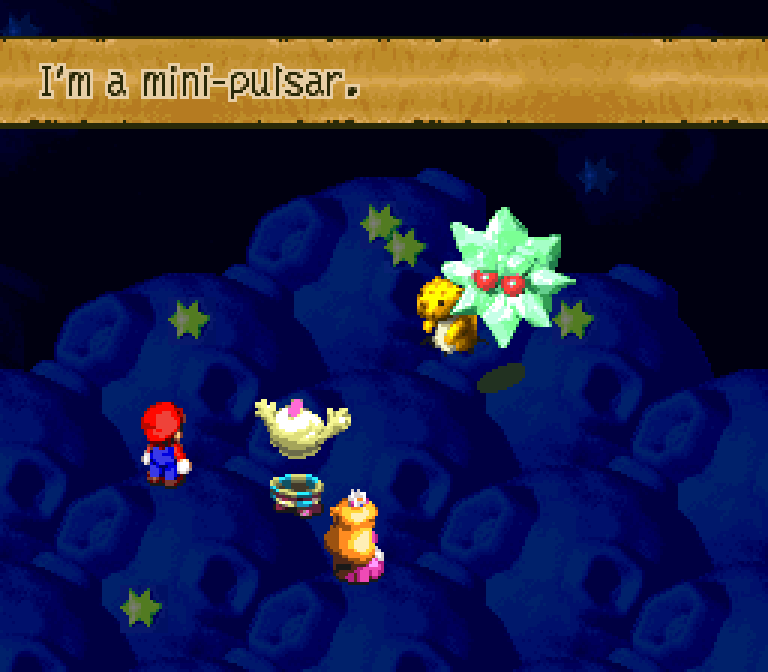 |
| "Hit me and you will be punished when I go up in smoke!" | "I'm a mini-pulsar." |
This Japanese enemy message is a gameplay tip coupled with a light reference to Sailor Moon’s famous catchphrase, “In the name of the Moon, you will be punished!”. At a glance, this enemy message might not seem like a reference when translated into English, but the message specifically quotes the unique and iconic oshioki yo phrase at the end of Sailor Moon’s Japanese catchphrase.
The Sailor Moon series was fresh and super-popular in the mid-1990s, so this unique catchphrase was naturally parodied and referenced all the time in Japan. And since this enemy is star-themed, it kind of makes sense that the writer would think of the Sailor Moon series.
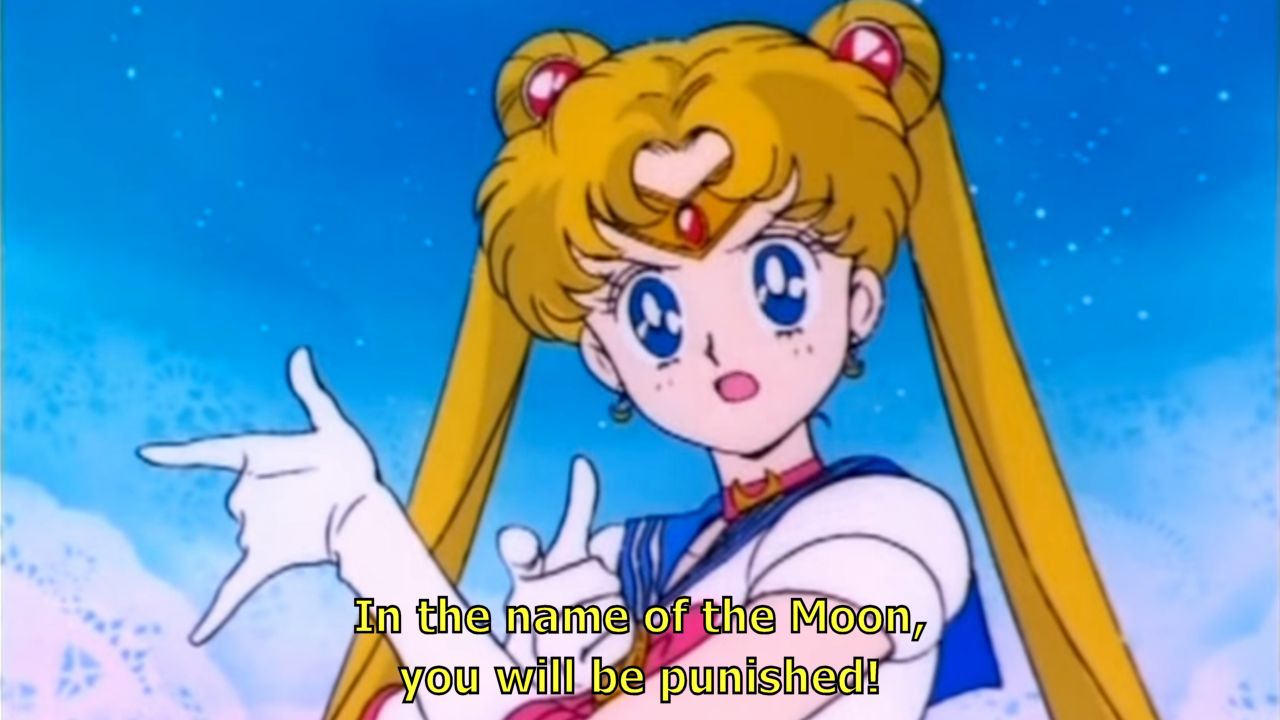
As mentioned, the Japanese enemy message also acts as a gameplay tip: if you hit this enemy in battle, it’ll fly up into the air and explode, causing one party member to instantly die.
The English version of Super Mario RPG drops both the reference and the gameplay tip. The result is the straightforward, not-very-helpful sentence: “I’m a mini-pulsar”.
Kānī / Crusty
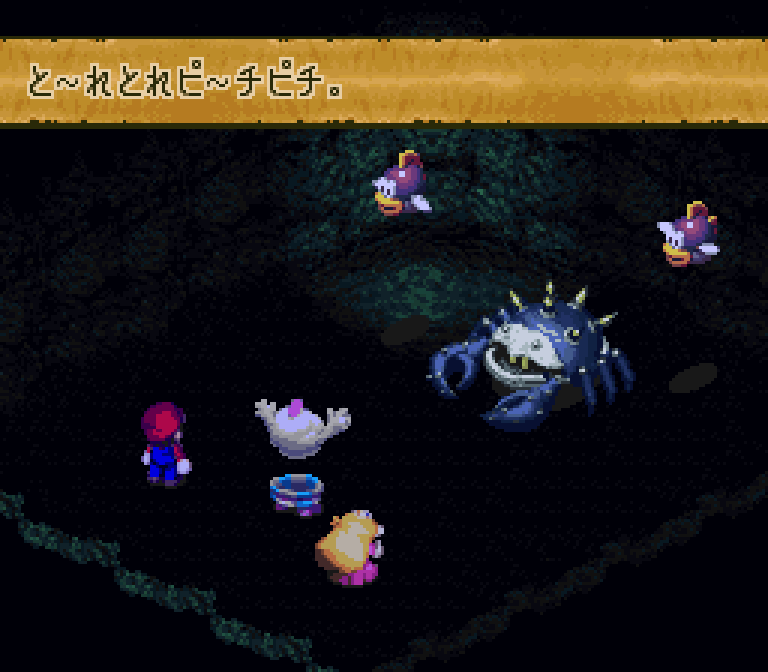 | 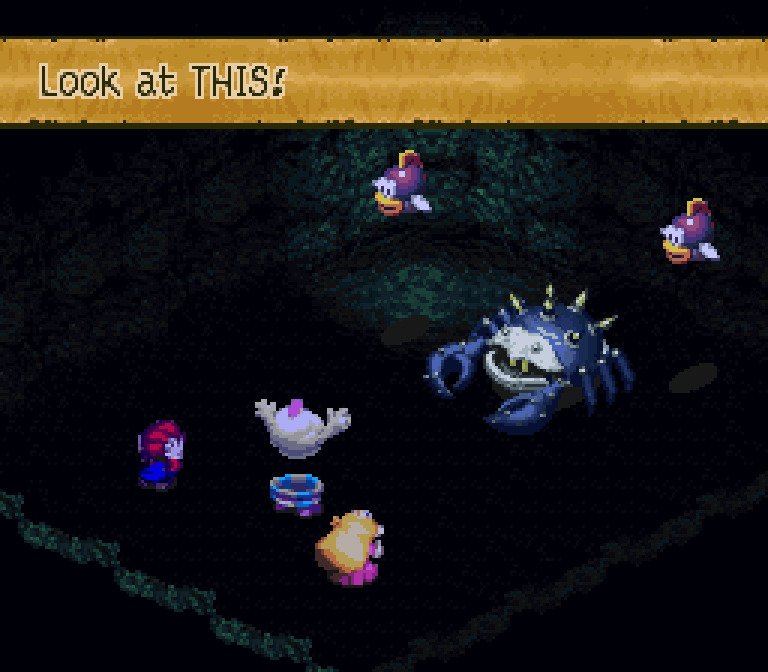 |
| "To~re tore pi~chi pichi." | "Look at THIS!" |
This Japanese enemy message is a direct reference to the classic commercial jingle for Kani Dōraku (“Crab Indulgence”), a seafood restaurant chain. The unusual phrase translates roughly into “fresh-caught and lively”, but sounds catchier in Japanese:
The English version of Super Mario RPG changes this line to “Look at THIS!”. My guess is that the English translator didn’t recognize the reference or understand what the Japanese phrase meant by itself.
Mamekuribō / Goombette
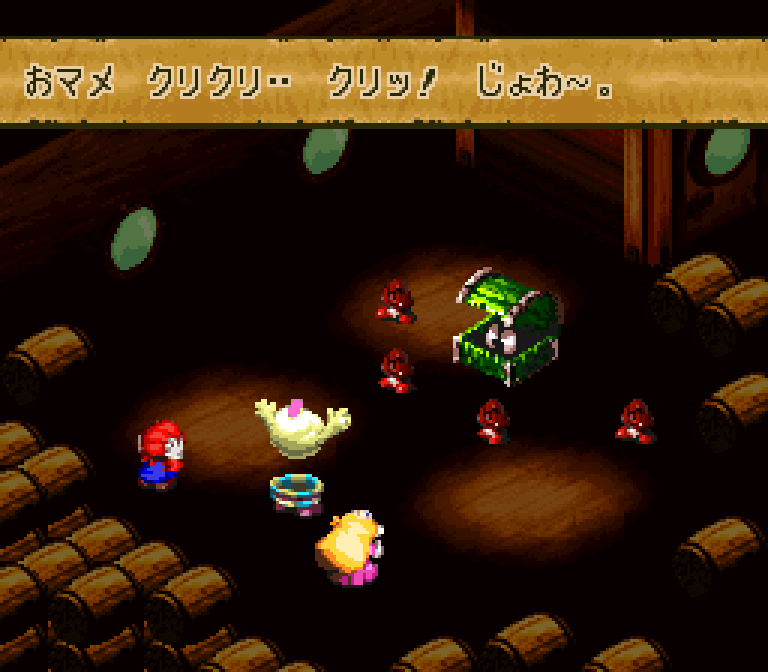 | 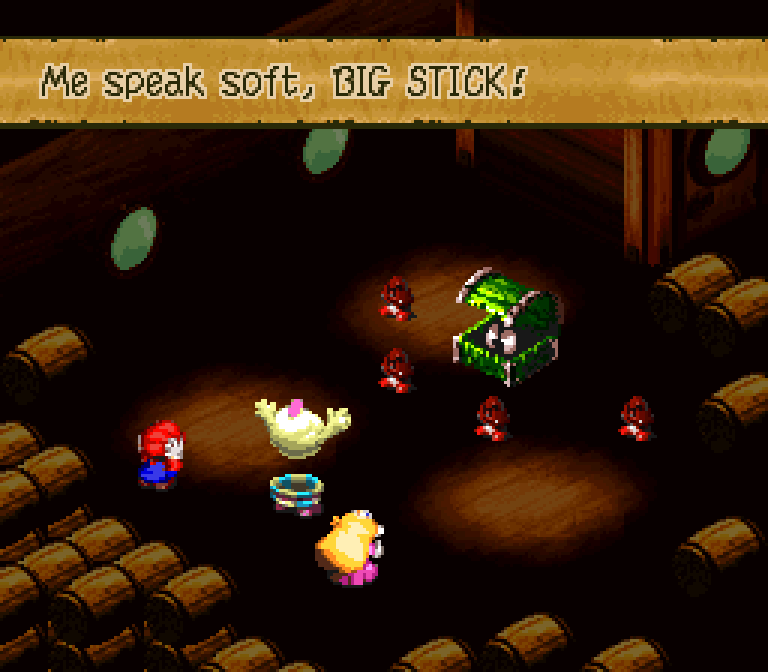 |
| "omame kurikuri... kuri! jowa~" | "Me speak soft, BIG STICK!" |
Okay, so this one takes a bit of explanation to understand in Japanese.
First, Goombas are known as kuribō in Japanese. But these ones are mame kuribō – the mame part can mean “pea” or “bean”. Basically, the name indicates that they’re tiny kuribō.
Next, the Japanese word kuri by itself can mean several things, but its usage here suggests it means “rub” or “rubbing” in a circular fashion.
Lastly, the jowa~ part is a little harder to explain and pin down in translation, but it’s usually a sound effect for liquid seeping out of something.
Taken all together, this message can be read as something like “Rub the bean, rub the bean, rub, rub… rub! Splosh~”.
Of course, this is also all a play on the mame kuribō name, so it’s up to the player to decide what exactly is being said. Maybe it literally is just talking about rubbing some beans or cooking a juicy dish with beans and chestnuts. Or maybe it’s something less literal. Whatever the case, many Japanese fans are in the latter camp and find the quote both hilarious and shocking. Some reactions I’ve seen include:
How is this still getting a “suitable for all ages” rating?
Maybe someone thought middle schoolers wouldn’t get it.
This isn’t good
ROFLLLL What were they thinking?!
What led them to include text like that?
What’s the big deal? It’s a mame kuribō, so it’s just saying “mame this” and “kuri that”, that’s all. There’s nothing wrong with it.
On top of all this, the enemy’s message, which begins with omame kurikuri, is also a play on the Japanese phrase omeme kurikuri (“big, round eyes”). So there’s all kinds of stuff going on in this little quote.
Anyway, the enemy’s name changed in translation, and none of the original wordplay would’ve worked anyway, so the Super Mario RPG translator went with something totally different: “Me speak soft, BIG STICK!”. This is a reference to an old saying made famous by Theodore Roosevelt in 1900: “Speak softly and carry a big stick; you will go far.”.

So, in a surprising twist, this English line actually adds a cultural reference when the Japanese version doesn’t.
Hachi Bīto / Buzzer
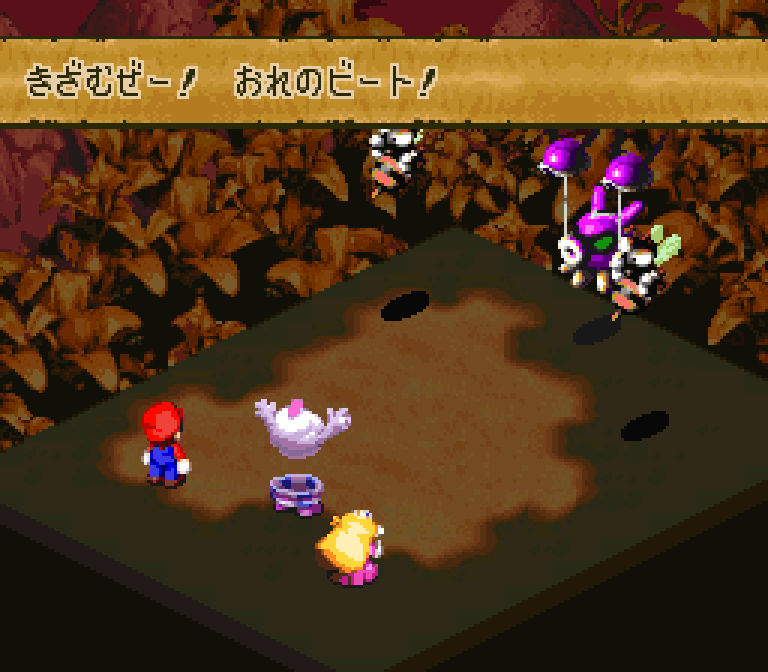 |  |
| "My beat keeps the rhythm!" | "Strike the pose!" |
To start off, this enemy’s Japanese name has some wordplay: hachi can mean “eight” but it can also mean “bee”, so the result is a name that means something like “Eight/Bee Beat” or “Eighth/Bee Note Beat”.
The enemy’s message in Japanese plays off of this “beat” theme by referencing a memorable line by Jonathan Joestar in Jojo’s Bizarre Adventure. I’ve seen it translated multiple ways into English, but here it is in Japanese:
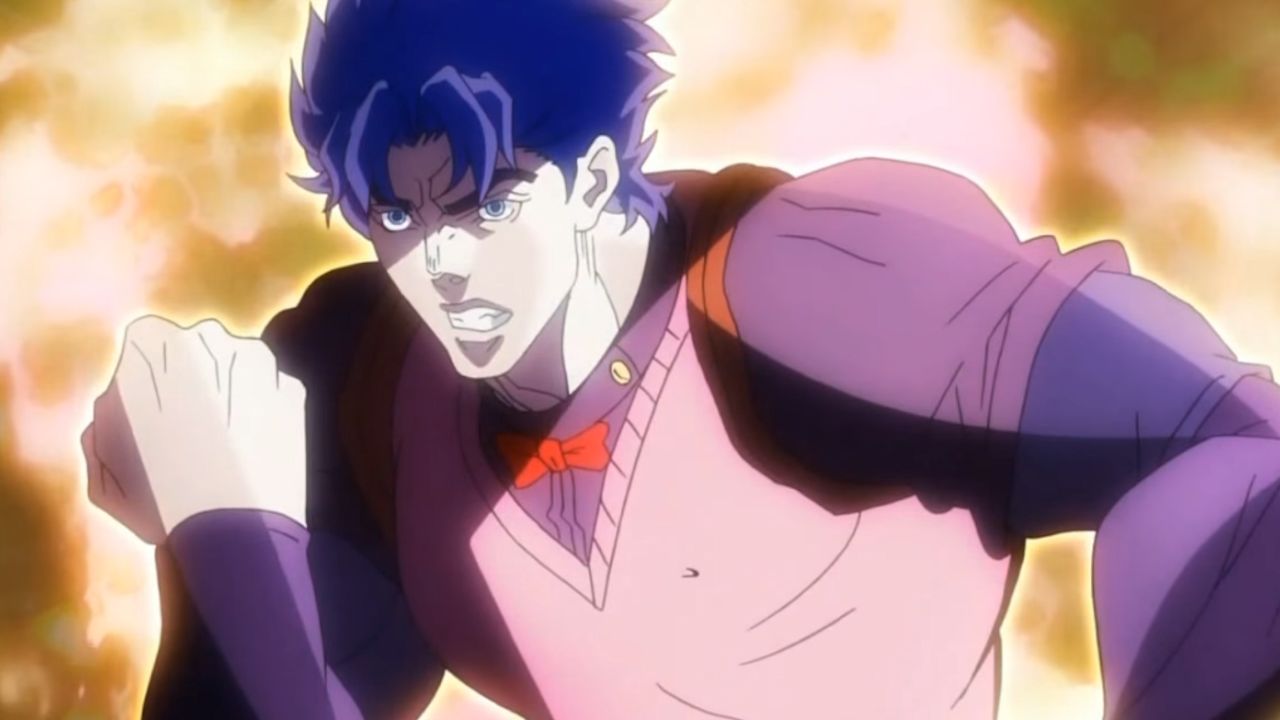
The English translator didn’t keep the original reference intact, but seems to have replaced it with a reference to the Madonna song “Vogue” instead:
While I can see how the Japanese enemy name and the Japanese enemy message connect, I don’t feel the English enemy and the English enemy message connect quite as clearly.
Belome
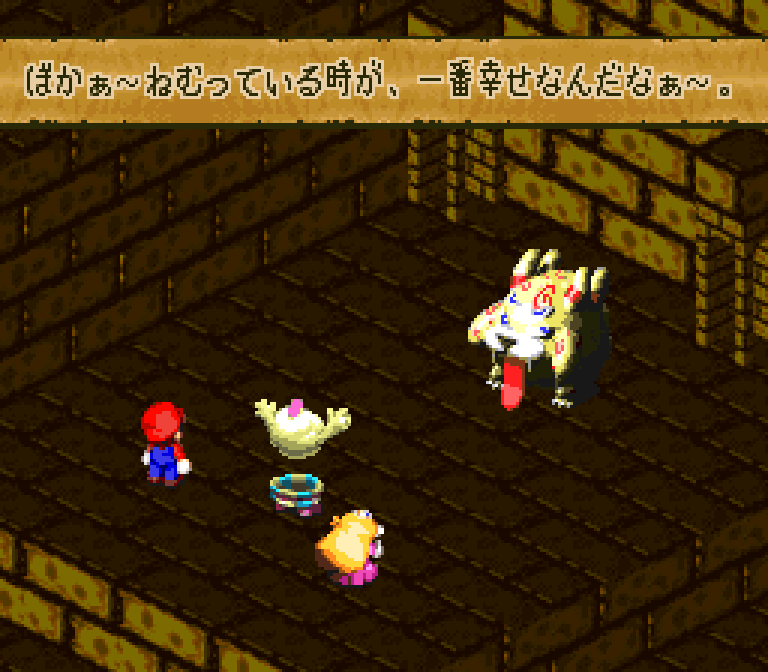 | 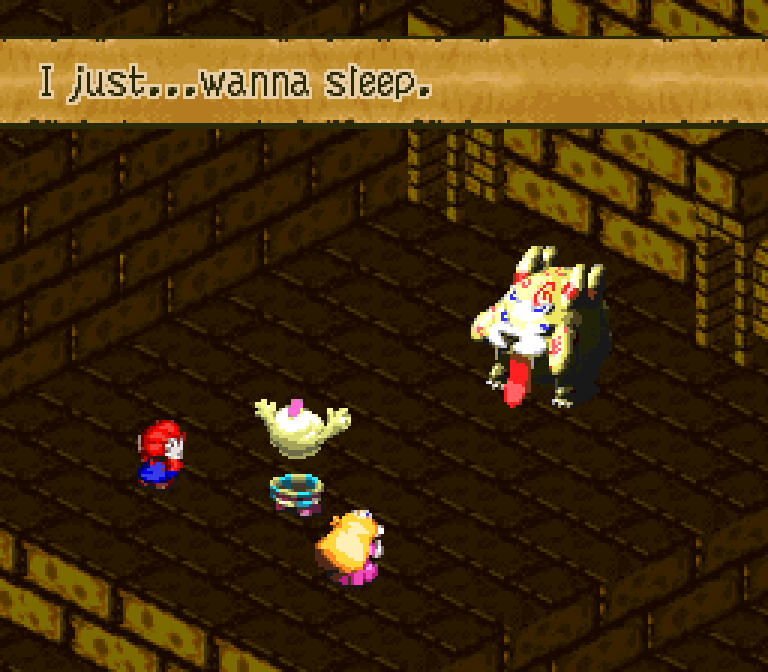 |
| "I'mmm happiest when I'm sleeping." | "I just...wanna sleep." |
Belome is a boss enemy that appears twice in Super Mario RPG.
Belome’s first Japanese message is a reference to the Hadaka no Taishō Hōrōki television series – in particular, it mimics the kind of thing the show’s main character would say, and how he would say it.
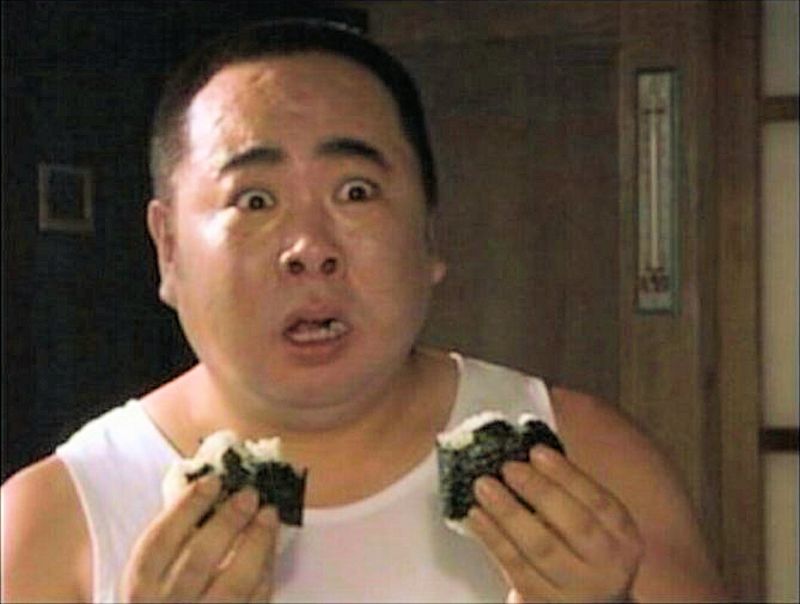
Belome’s second message later in the game continues the reference, but changes it to another phrase that the TV show’s main character might say:
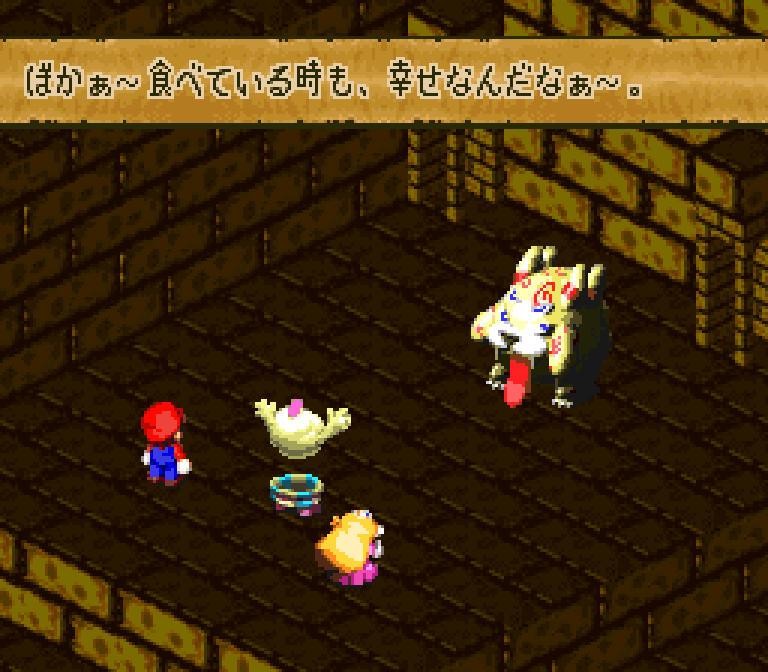 | 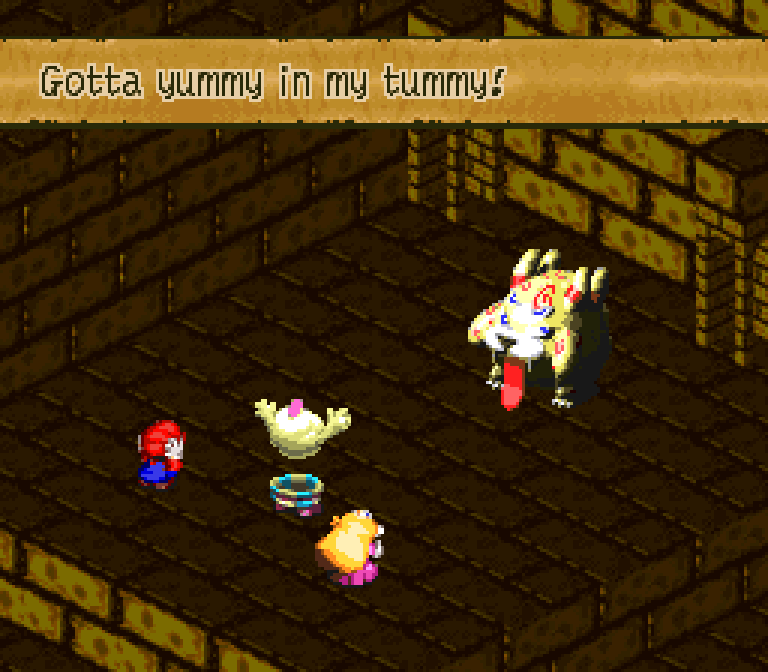 |
| "I'mmm also happy when I'm eating." | "Gotta yummy in my tummy!" |
The Super Mario RPG translator understood what the the words of these messages but not the significance. It’s understandable, though – it’d be hard to recognize these simple lines as references unless you grew up with classic Japanese television or were familiar with it in some other way.
Jackie / Jinx (1st Fight)
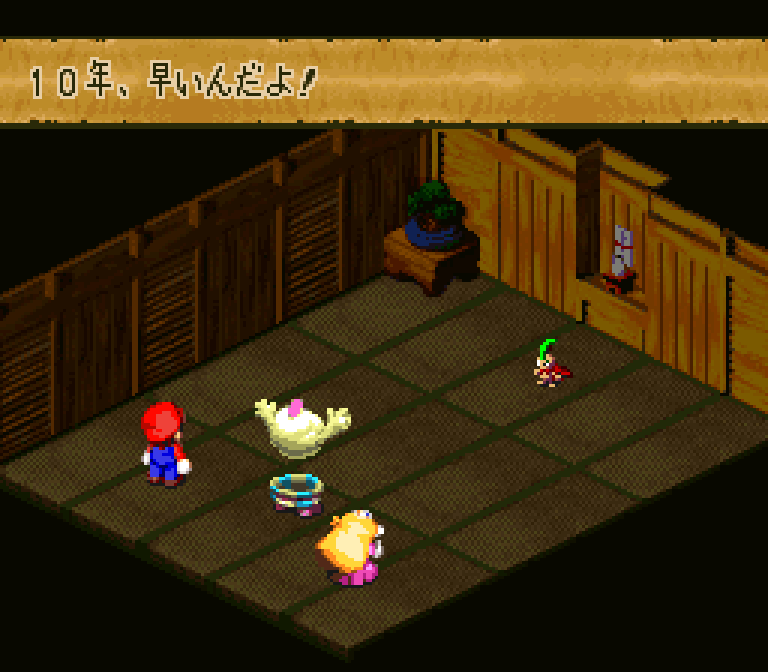 | 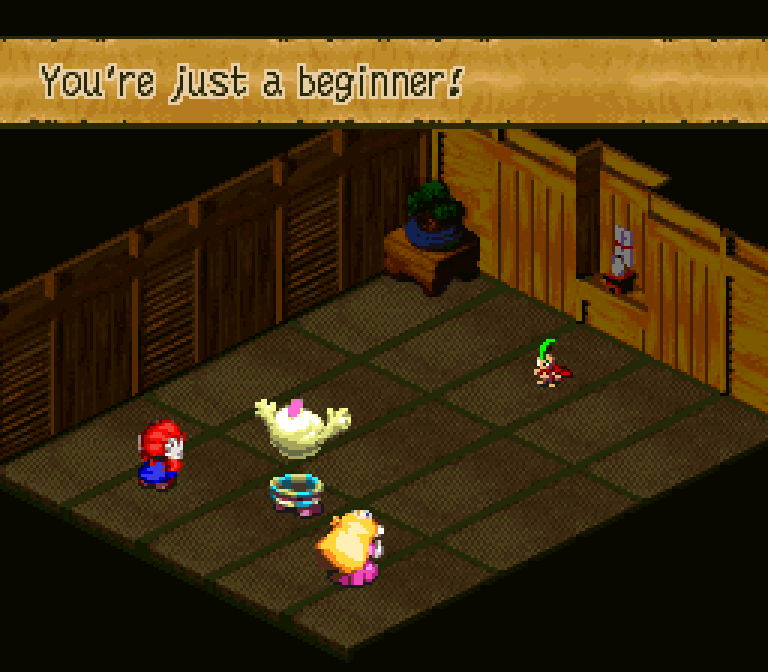 |
| "You're ten years too early!" | "You're just a beginner!" |
This enemy is a little different from the others – it’s got a “martial arts battle against a dojo master” theme that spans three separate battles.
In this first battle, the Japanese enemy message is a direct quote from Virtua Fighter, a popular game in Japanese arcades at the time of Super Mario RPG’s development. It’s one of Akira’s victory quotes, yet the phrase isn’t entirely rare in Japanese entertainment, so I wasn’t fully convinced this line was a reference at first.
Still, the specific Japanese phrase, jūnen hayainda yo, matches 100% with Akira’s victory quote, yet doesn’t quite fit with Jackie’s other speech patterns in battle, plus Jackie’s other battle quotes are references. So despite my own skepticism, I’m guessing this is why Japanese fans and fan sites do seem to be convinced.
Again, this is one of many phrases in Japanese that basically means “you still need lots of experience”. This is why the Super Mario RPG translator went with “You’re just a beginner!” in the English release.
Jackie / Jinx (2nd Fight)
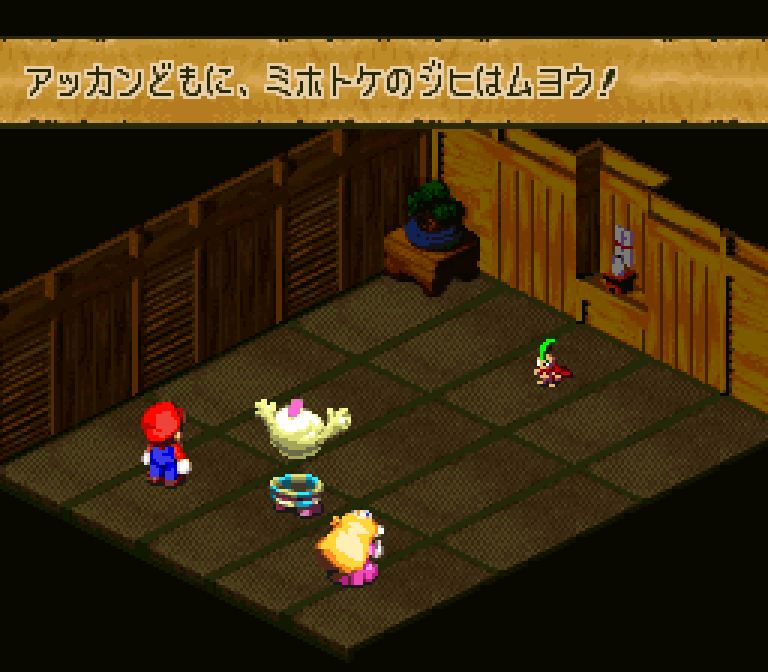 | 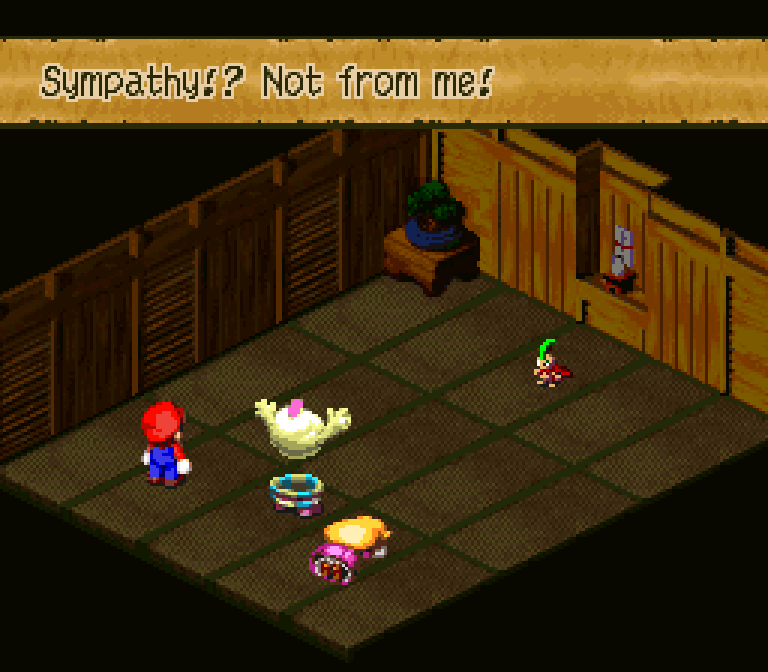 |
| "Evildoers do not deserve the Buddha's mercy!" | "Sympathy!? Not from me!" |
This Japanese enemy message is another direct quote from Giant Robo: The Day the Earth Stood Still. It’s a unique phrase that appears on-screen in the middle of an exciting scene:
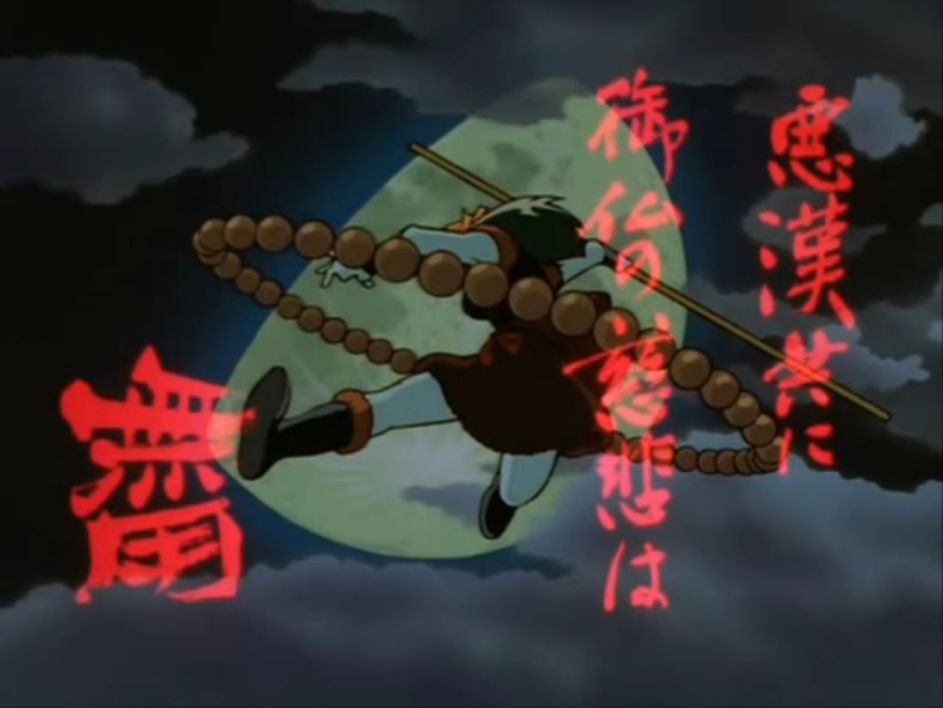
The Super Mario RPG translator understood that the Japanese line is about mercy or sympathy, so the resulting translation became “Sympathy? Not from me!”. This also strikes me as a straightforward translation and not a reference to anything of its own.
Jackie / Jinx (3rd Fight)
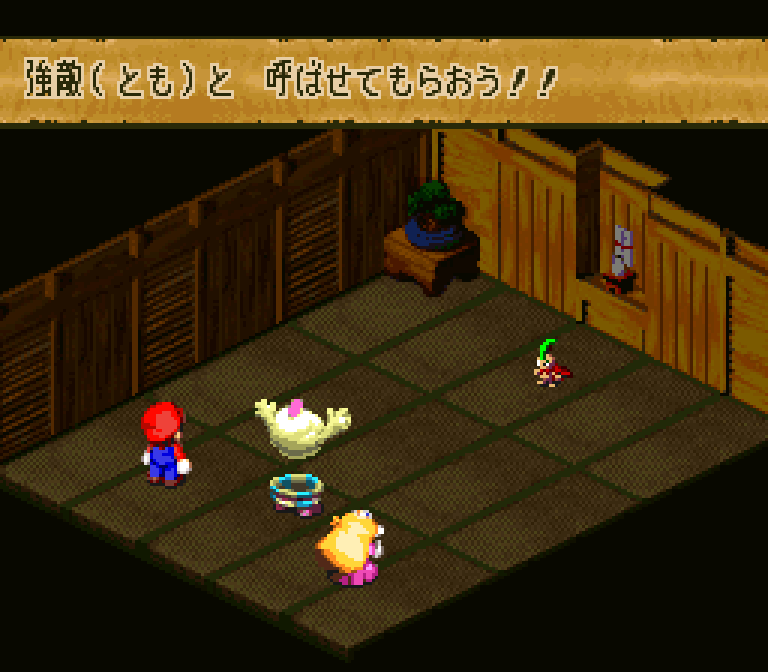 | 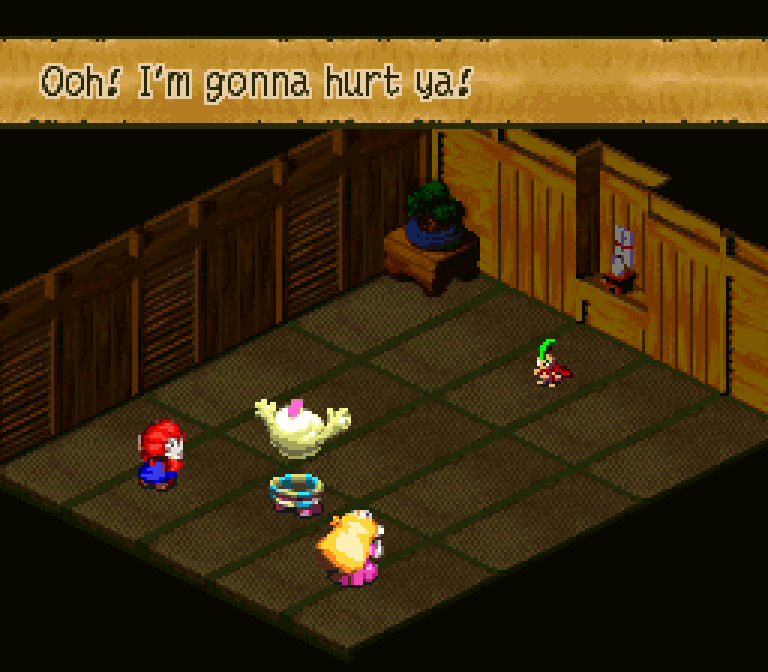 |
| "I've etched your hot fists into my mind! I'll now call you my rival (friend)!" | "Ooh! I'm gonna hurt ya!" |
This Japanese enemy message is unusual in that it actually spans two text boxes. Part of the line is also a reference to Fist of the North Star.
Basically, throughout the Fist of the North Star series, the main character encounters powerful enemies. But in the main character’s dialogue, the Japanese term 強敵 (kyōteki, "powerful enemy") is usually given the alternate reading of tomo (“friend”). We can see this at work in the manga:

Anyway, we can see in the Japanese Super Mario RPG quote that “powerful enemy” is given the alternate reading of “friend” in parentheses. Players familiar with the Japanese Fist of the North Star series would instantly recognize this reference.
I’m not sure if anything else in the Japanese Super Mario RPG quote is a direct reference to Fist of the North Star, but the writing at least fits the same style.
The Super Mario RPG translator cut the long Japanese text down to a single text box and changed the line to “Ooh! I’m gonna hurt ya!”, which I don’t believe is a reference to anything.
Wind Crystal
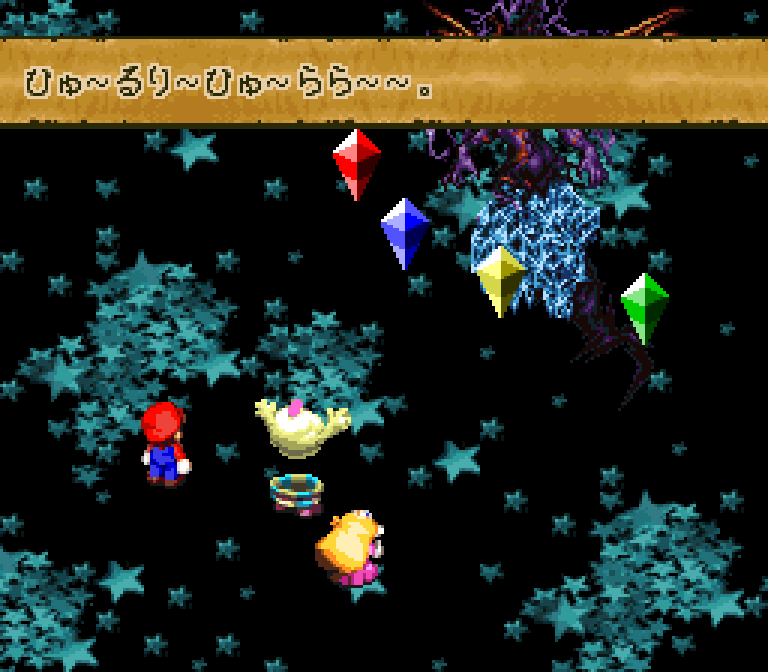 | 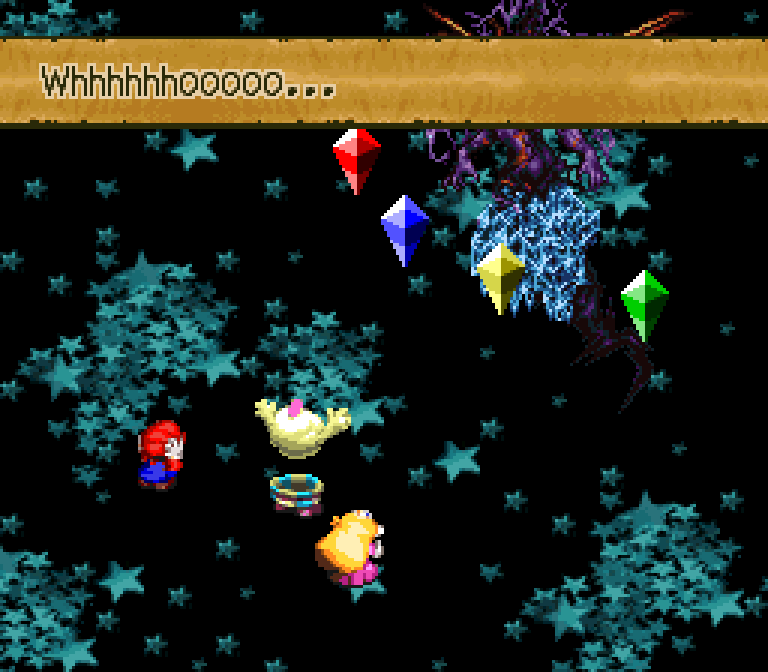 |
| "Hyu~ruri~ Hyu~rara~." | "Whhhhhhooooo..." |
This enemy appears during a secret, optional boss battle against Culex, a Final Fantasy-themed enemy who’s surrounded by elemental crystals. In Japanese, the Wind Crystal’s enemy text isn’t an actual message – it’s just a made-up sound effect phrase that evokes the image of wind blowing.
It turns out that this windy phrase is from “Ettō Tsubame”, a popular Japanese song from 1983:
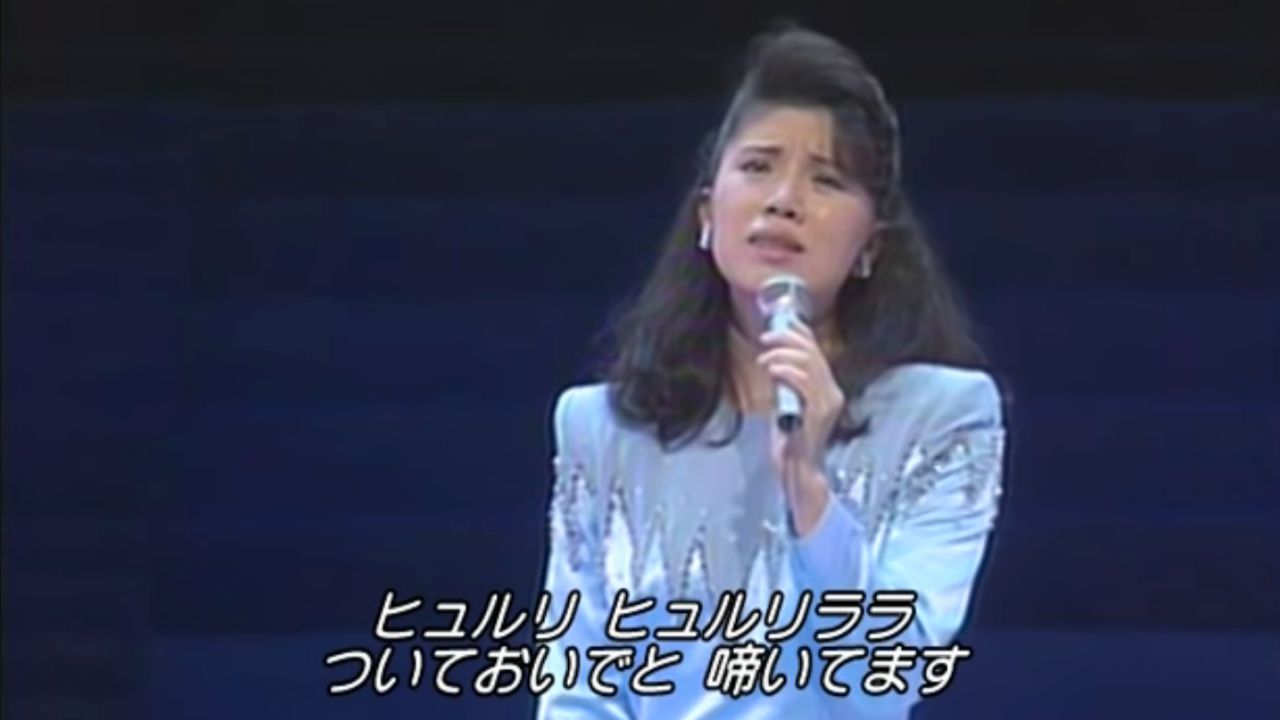
The Super Mario RPG translator seems to have caught on to the wind theme of the line with “Whhhhhhooooo…”, which seems to be a straightforward, windy “woosh” sound.
Margarita / Valentina
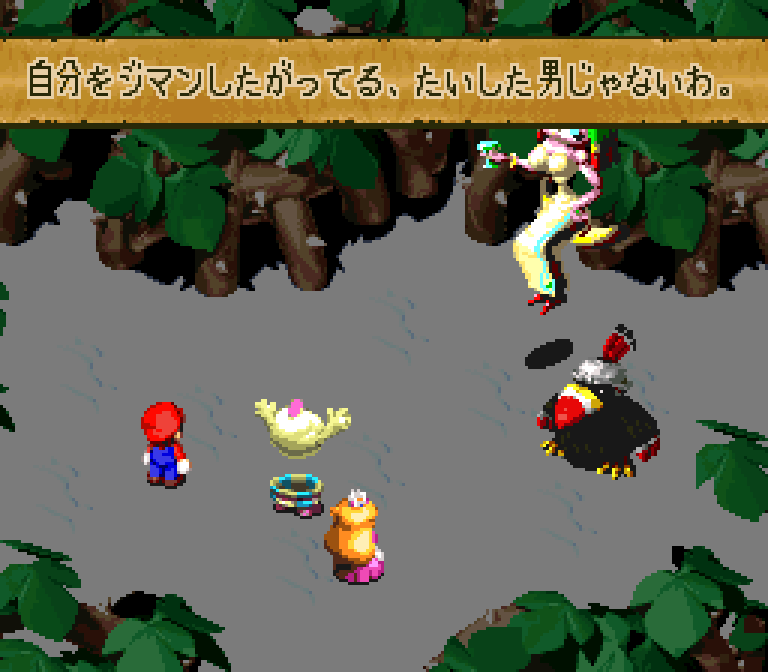 | 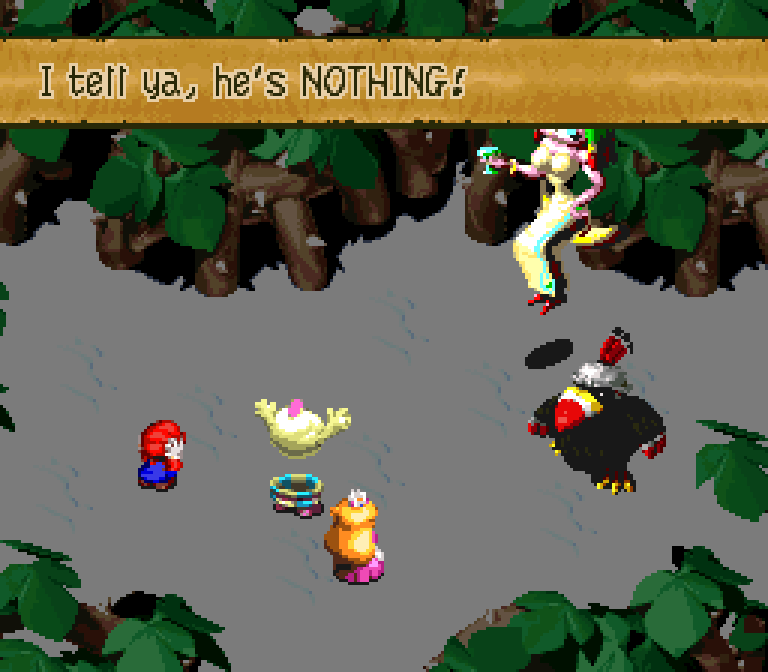 |
| "He's just a show-off. He's a small man." | "I tell ya, he's NOTHING!" |
This Japanese boss message – which comes from the floating lady enemy seen above – is actually another reference to Neon Genesis Evangelion. It’s almost an exact quote, but one part was cut out, probably so it could all fit inside one text box.
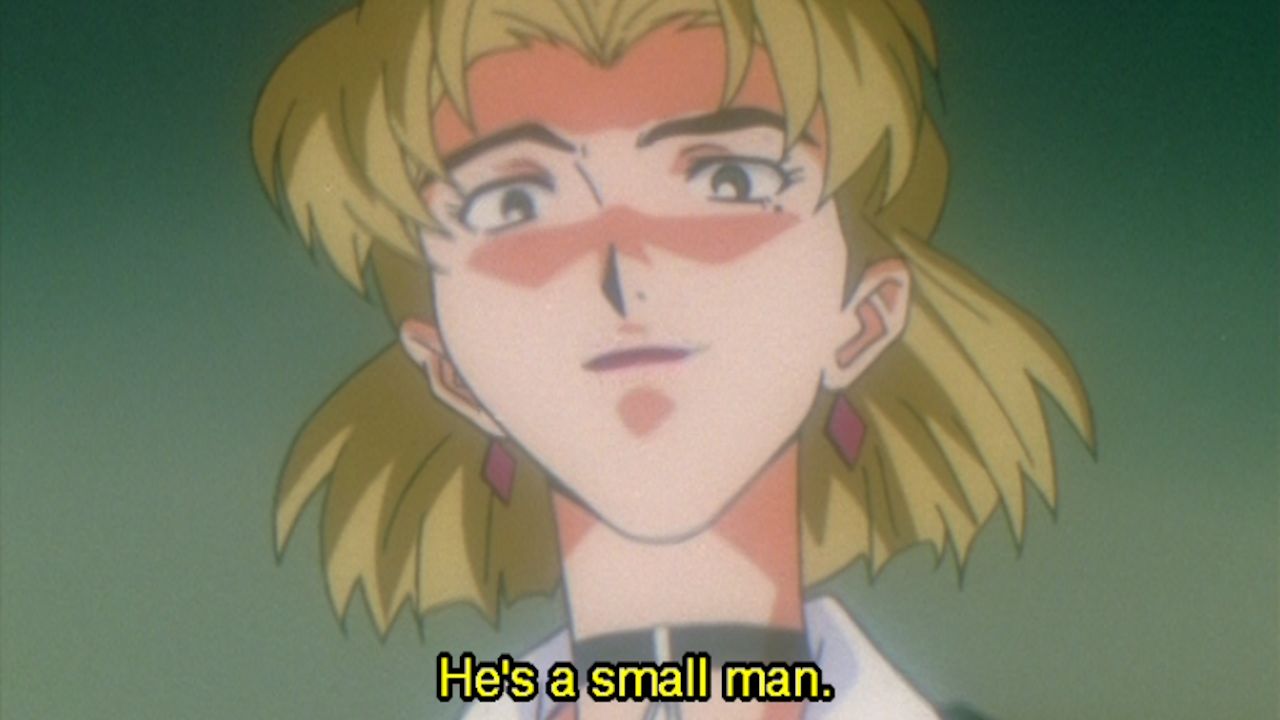
The English version of Super Mario RPG keeps the base meaning of the original text intact with “I tell ya, he’s NOTHING!”, but the connection to Neon Genesis Evangelion is almost unrecognizable. Of course, Neon Genesis Evangelion didn’t get official English releases until a year after Super Mario RPG was released, so not many English-speaking players would’ve gotten the reference anyway.
Dragon Zombie / Zombone
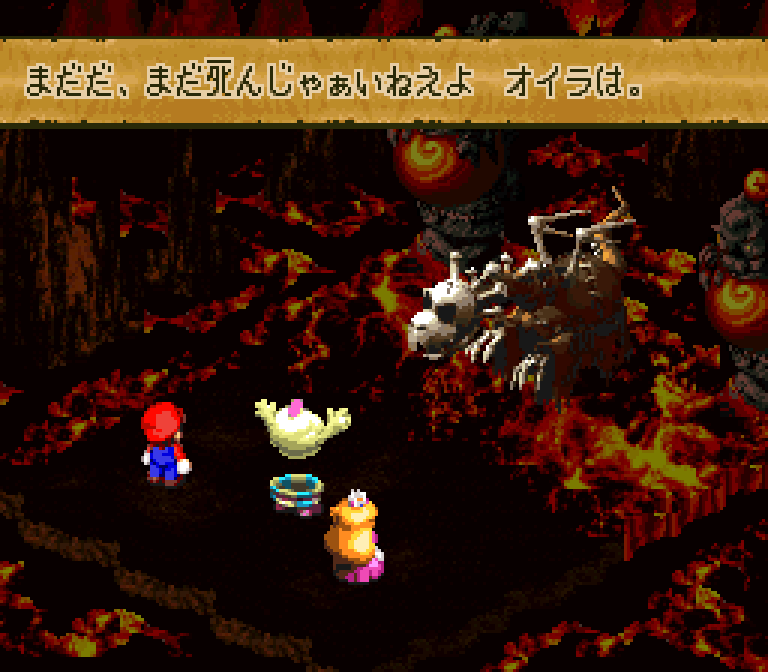 | 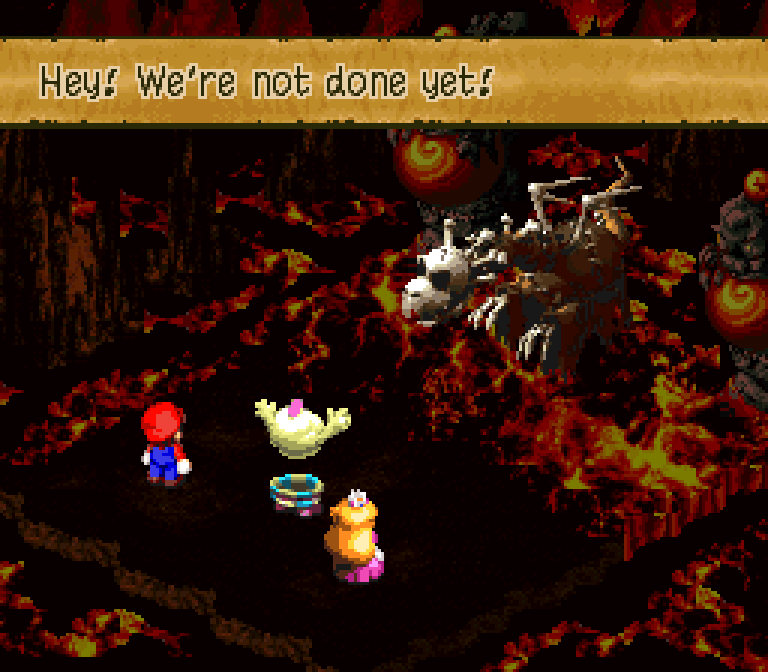 |
| "Not yet. I'm not dead yet." | "Hey! We're not done yet!" |
There are two parts to this boss battle: first you battle a big dragon monster, and then it transforms into a skeleton dragon after it falls into the lava below.
The Japanese message for this second form is supposedly a loose reference to a line from Mobile Suit Zeta Gundam: “Not yet! I’m not done yet!”.
This line appears in the show after one of the main characters has taken tremendous damage, is miraculously still alive, and should really not be fighting anymore. It’s an iconic scene and an iconic line in the series, and it fits this same situation in Super Mario RPG.
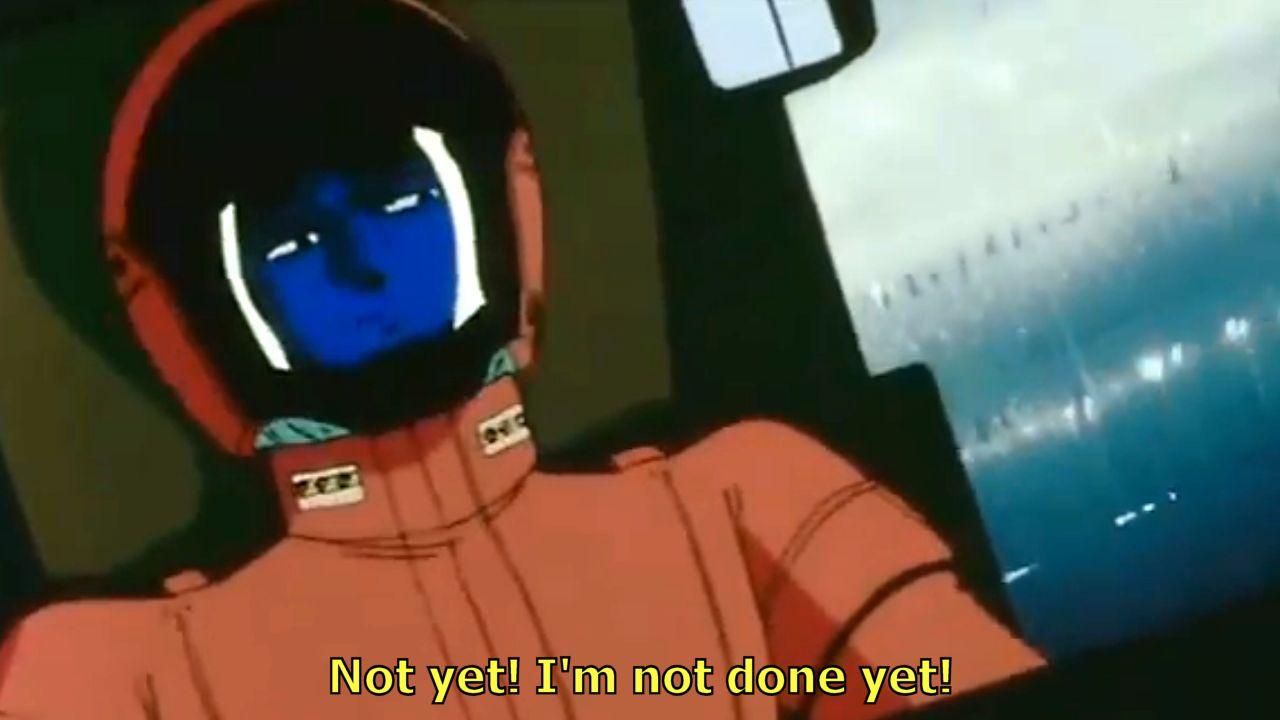
The English version of Super Mario RPG keeps the basic meaning of the original line intact with “Hey! We’re not done yet!”.
It’s possible the part about dying was changed during localization to adhere to Nintendo of America’s content policies, but in an interesting twist, this change actually brings the line closer to the original Mobile Suit Zeta Gundam quote.
Axe Force / Axem Rangers
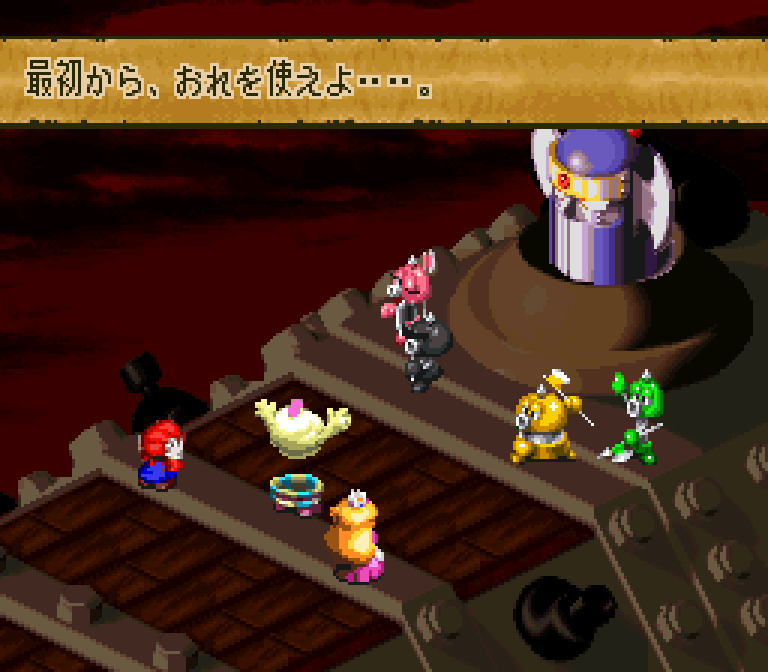 | 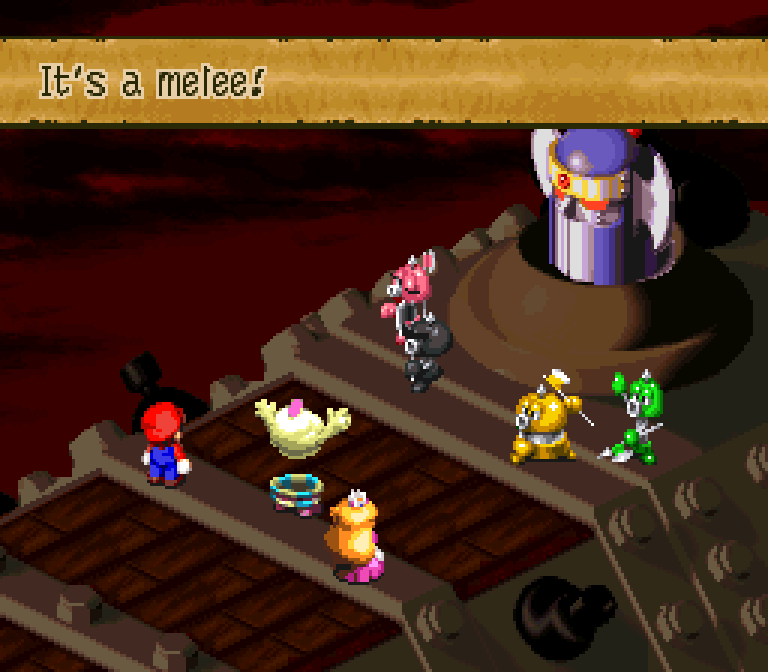 |
| "C'mon, just use me from the start..." | "It's a melee!" |
In this unique boss battle, Mario and friends fight and defeat a team of Super Sentai/Power Ranger-like enemies. Once the team members are defeated, they regroup and try to defeat the heroes using their giant axe robot.
The Japanese message for this giant robot isn’t so much a reference as a thought that has probably passed most fans of Super Sentai shows or the Mighty Morphin Power Rangers series: why don’t they just use their giant robots first?!
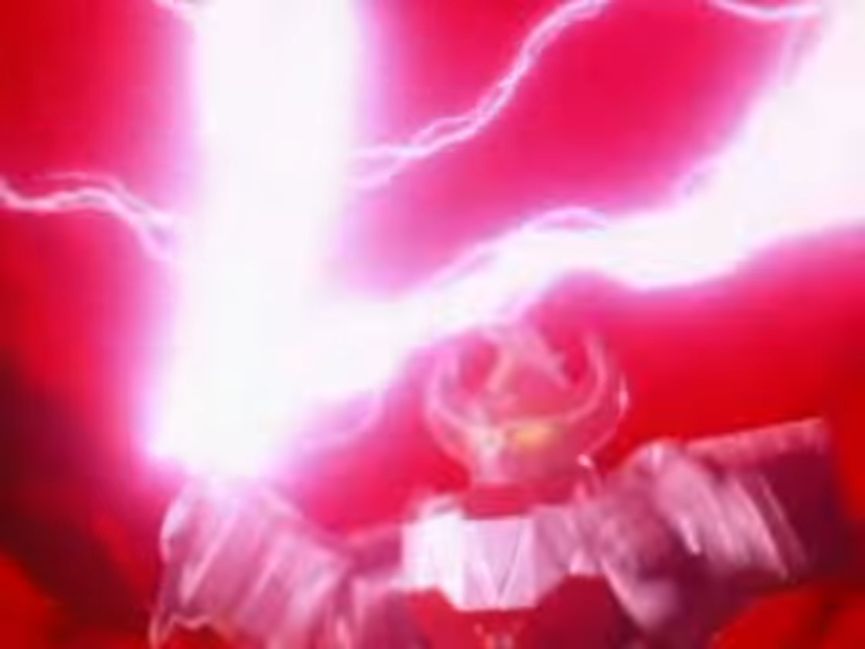
The English version of Super Mario RPG changes this enemy’s message to “It’s a melee!” for some reason, but I’m not sure why.
Star Kānī / Star Cruster
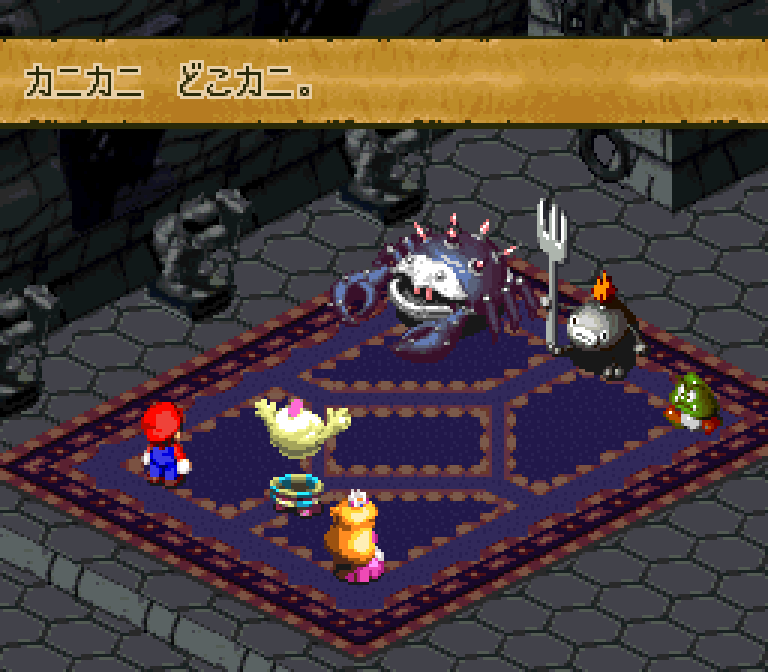 | 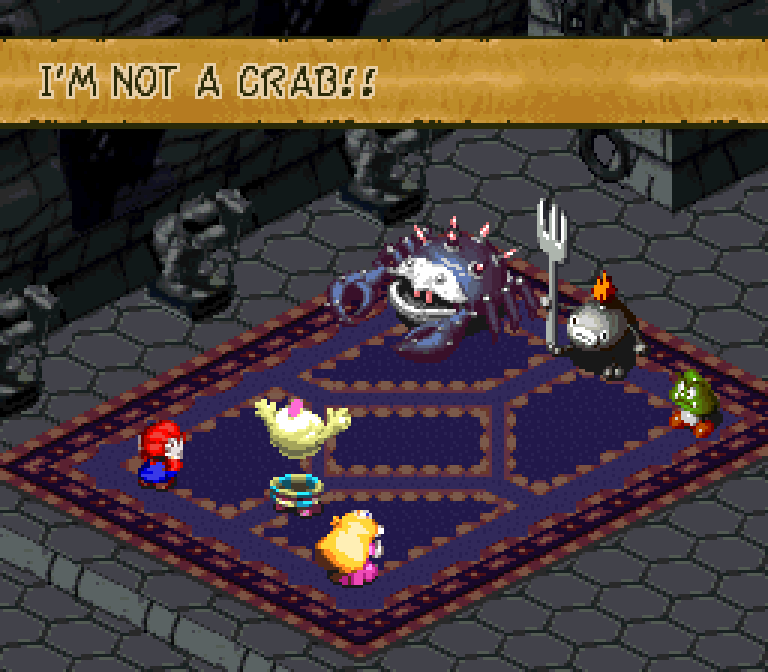 |
| "KANI KANI doko KANI." | "I'M NOT A CRAB!!" |
This enemy’s message is a direct reference to a line in the classic Famicom game, Sanma no Meitantei. The game stars the legendary Japanese comedian Sanma Akashiya, who also helped design the game. As you might expect, the game is full of comedy, jokes, and puns.
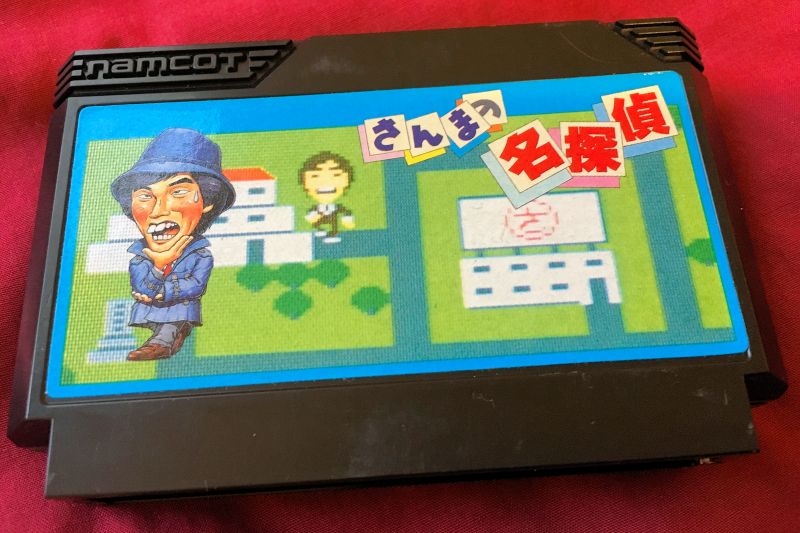
One example of the silliness in Sanma no Meitantei is the search cursor. Instead of the normal cursor arrow you’d expect in a Famicom detective game, it’s a crab. And every time you use the crab to look for something, the text kani kani doko kani? appears.
It’s hard to translate kani kani doko kani into a single line, but it’s basically wordplay involving the words “crab” and “where”. And since it’s a detective game, this “crab/where” line appears very often – enough to become an in-joke among Japanese gamers at the time.

In the English version of Super Mario RPG, this crab enemy’s message changed to “I’M NOT A CRAB!!”.
Based on personal experience, my guess is the translator saw the Japanese line, didn’t recognize the reference, and went for a straightforward translation. One plain interpretation would’ve been along the lines of “In what way am I a crab?!” or “I’m not a crab!”.
Oyster / Forkies
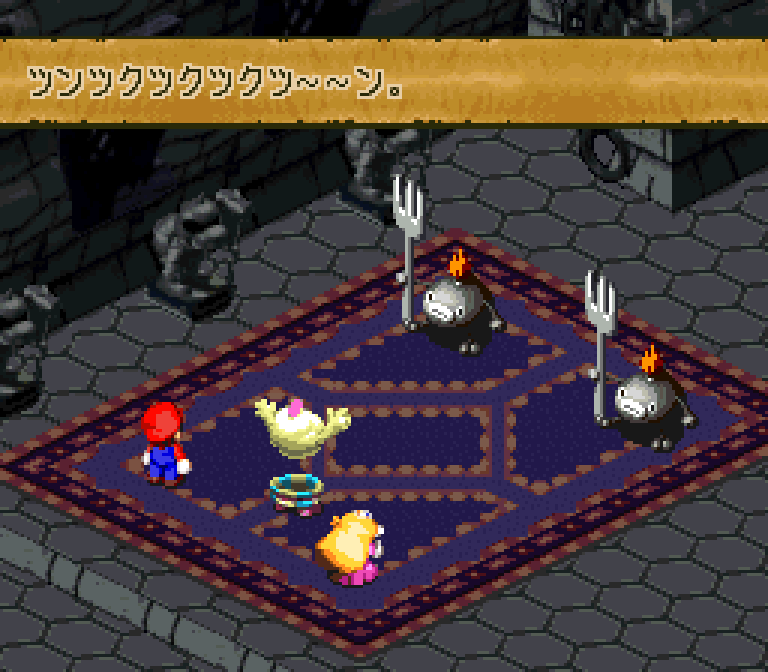 | 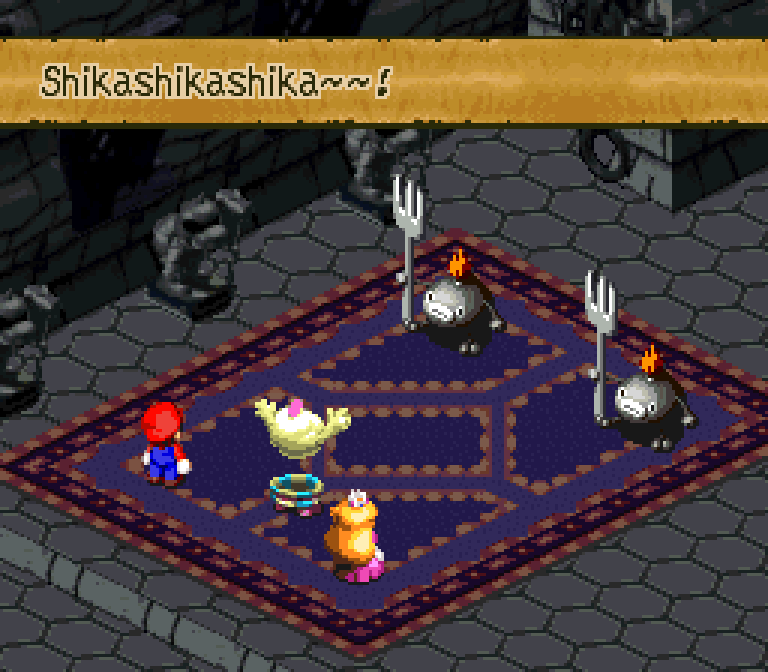 |
| "Tsun tsuku tsuku tsuku tsu~~n." | "Shikashikashika~~!" |
This Japanese enemy message is a reference to a classic comedy routine parodying a famous Japanese piece of music, combined with the sound effect of something being poked.
First, here’s “Haru no Umi”, a piece of music that’s famous in Japan and gets played all the time, especially during the New Year’s holiday season. The opening is especially well-known and iconic:
In the 1970s, the Japanese comedians Shirō Itō and Masao Komatsu performed comedy routines that featured this iconic intro. Part of the routine involved recreating “Haru no Umi” with nonsense words like “tsun tsuku tsuku tsuku tsun”:
So here we have Japanese Super Mario RPG enemies reciting these joke lyrics… but why? In Japanese, tsun tsun and tsuku tsun also evoke the image of poking, jabbing, or stabbing something. These enemies carry giant forks around, so it’s a logical fit.
The English version of Super Mario RPG changes this line to “Shikashikashika~~!”. I’m not sure if this is a reference to anything specific, but it does make me think of something getting skewered over and over.
Kamezādo / Magikoopa
 | 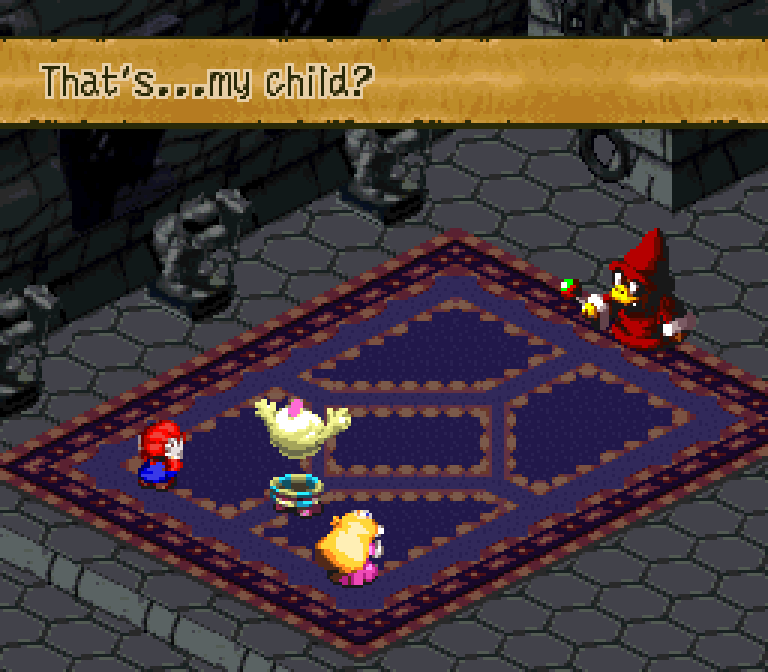 |
| "Kiii ukiii! You're that baby from that one time!?" | "That's...my child?" |
This Japanese enemy message is a reference to Super Mario World 2: Yoshi’s Island, in which this Magikoopa foe kidnaps Mario and Luigi when they’re babies. The Magikoopa accidentally drops baby Mario and struggles throughout the game to recapture him.

In the English version of Super Mario RPG, the connection to Yoshi’s Island is somewhat broken: “That’s…my child?”. My guess is that the translator wasn’t aware of the Yoshi’s Island connection and didn’t have sufficient context for the line.
Boomer
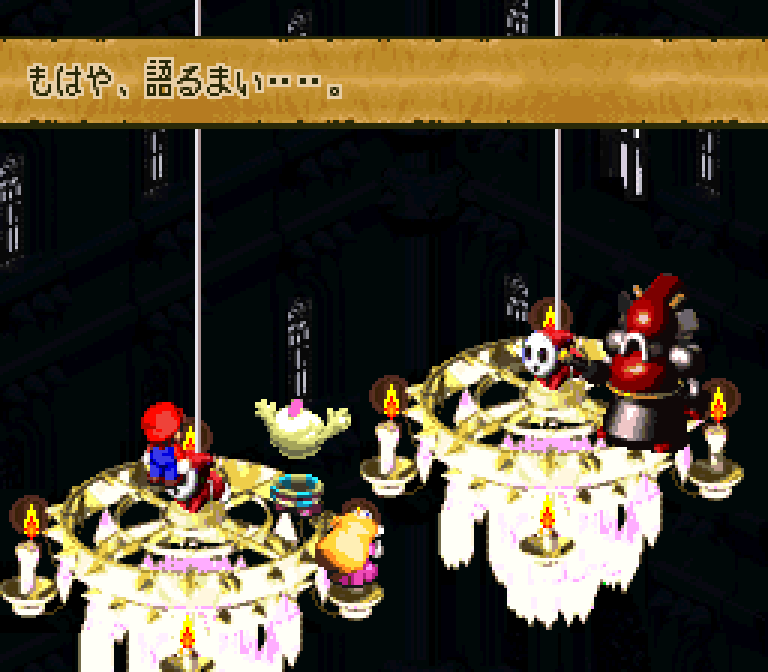 |  |
| "There is nothing more to be said." | "It's all over now..." |
In Japanese, this boss enemy’s message is a direct quote from Mobile Suit Gundam 0083. Specifically, it’s during a memorable battle scene between two skilled pilots, Anavel Gato and Kou Uraki.
The Japanese phrasing is a bit unique and sounds like something you’d hear from a stoic, experienced warrior or samurai-like character. It sounds both cool and memorable, so it’s no surprise that the Super Mario RPG writers thought of it when designing this samurai-themed boss.
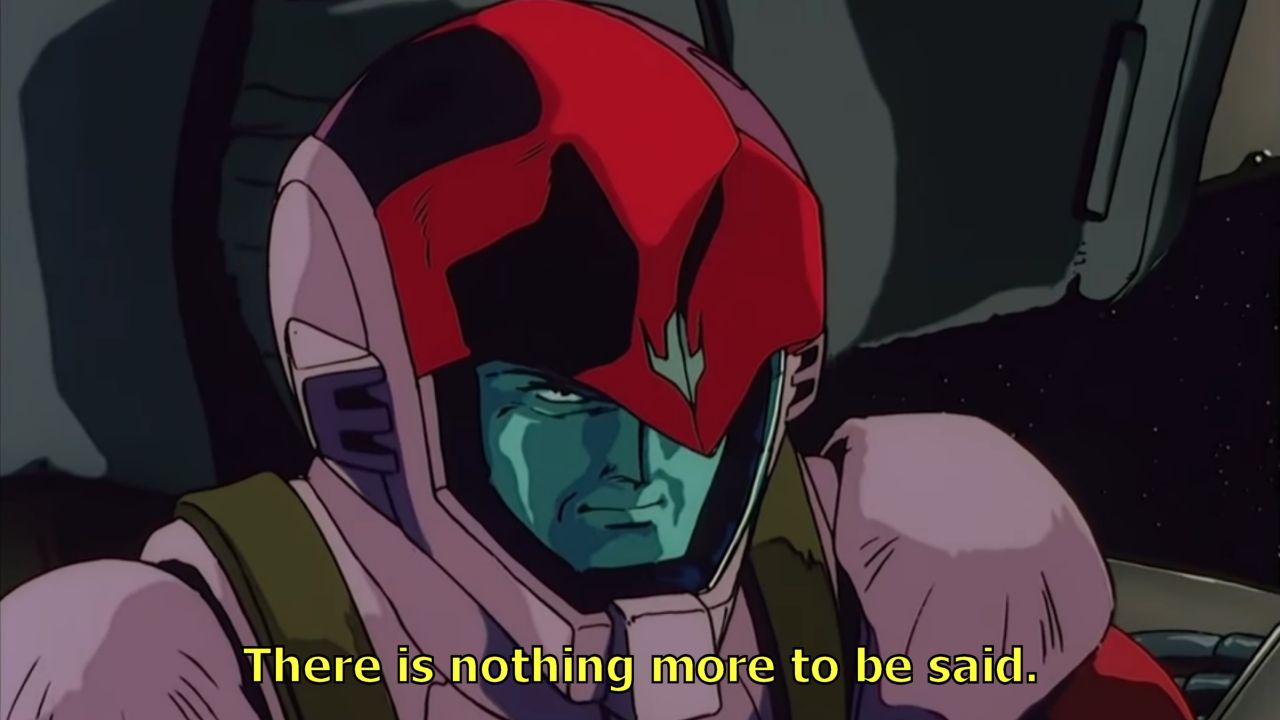
The English version of Super Mario RPG goes with “It’s all over now…”, which I remember confused me when I recently replayed the game. It almost makes it sound like the boss is giving up, although I see how it could be interpreted differently. In any case, I don’t get the feeling that the English version is a reference to anything.
Puyomēba / Ameboid
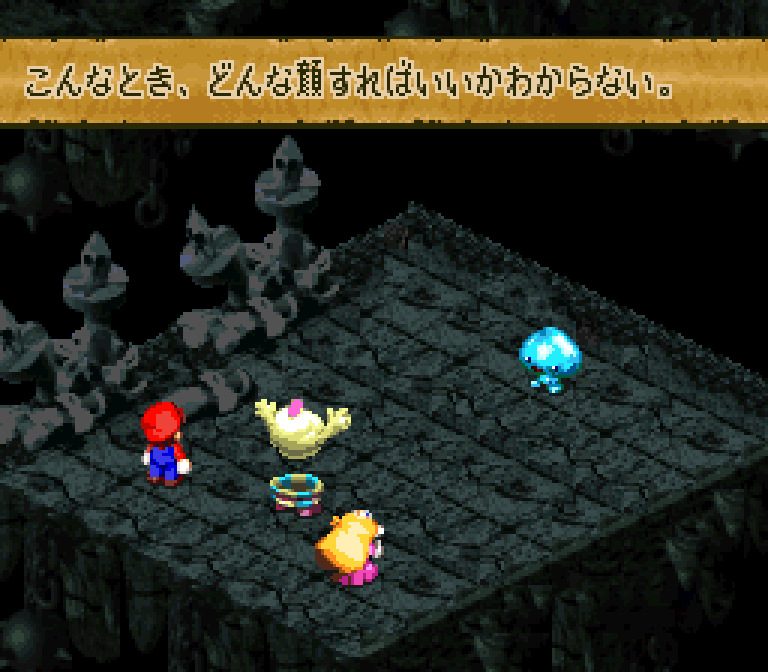 |  |
| "I don't know what kind of face to make at a time like this." | "Get outta my face." |
This enemy’s Japanese message is another direct quote from Neon Genesis Evangelion. I’m not really sure why this quote was chosen for this enemy, except maybe its vague resemblance to Rei or maybe because the enemy is amoeba-like and is mostly featureless.
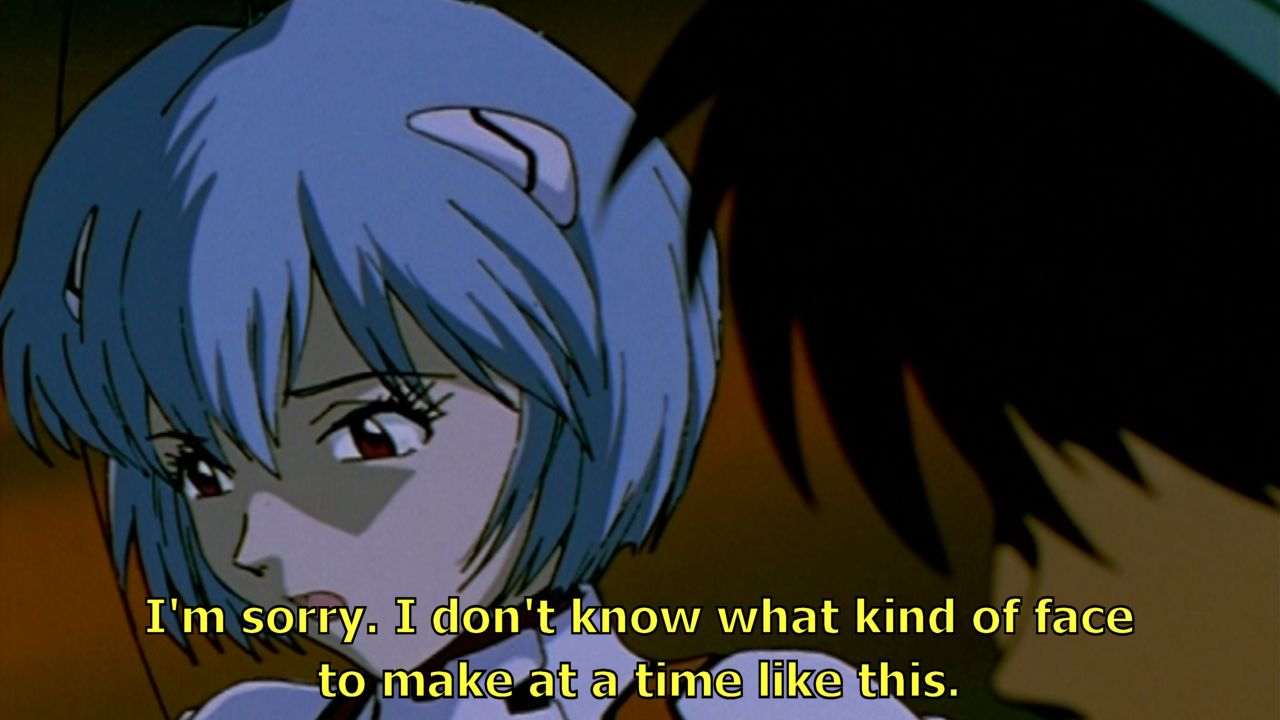
The English version of Super Mario RPG drops the reference and changes the line entirely. It looks like the translator understood that the line was about faces, but created a new line rather than a translation of the original.
Ninja-kun / Ninja
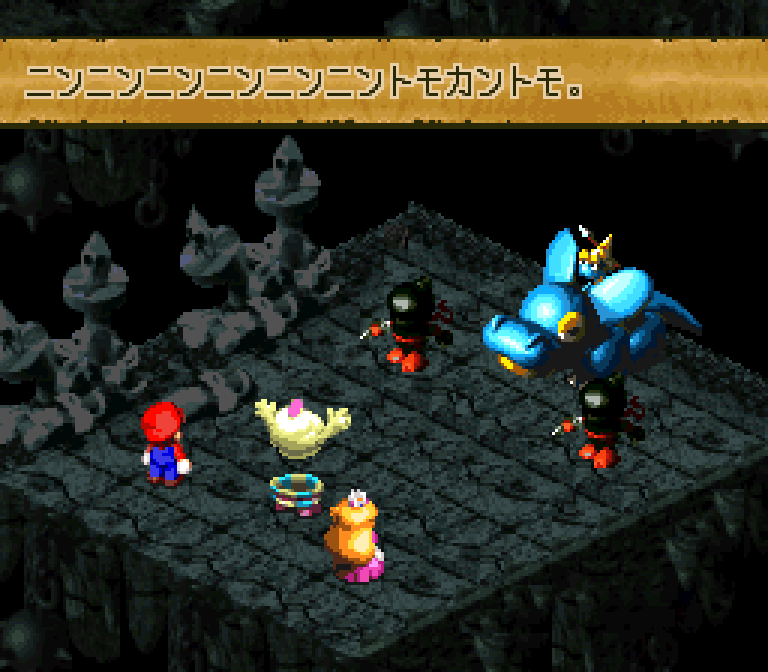 | 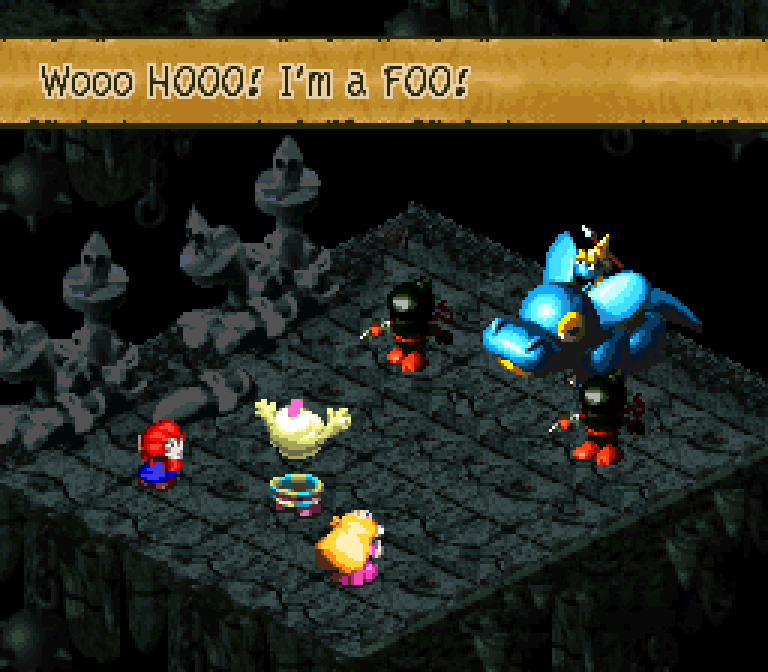 |
| "Nin nin nin nin nin nintomo kantomo." | "Wooo HOOO! I'm a FOO!" |
This Japanese enemy message is a reference to the classic Ninja Hattori-kun manga and anime series. The reference comes in two parts.
First, it’s common for ninjas in lighthearted Japanese entertainment to say nin-nin when sneaking around. It’s not a real word or anything – it’s just the nin in ninja and gives off the general idea of “stealthiness”. It goes without saying that Hattori-kun says it all the time. In fact, he makes non-stop nin-based puns throughout the series.
Next, one of Hattori-kun’s unique phrases is nintomo kantomo, which is a nin-ified version of nantomo kantomo (“can’t really put into words”).
The connection between this Super Mario RPG enemy and Hattori-kun is pretty clear – not only are they ninjas, but the Japanese enemy name is literally “Ninja-kun”.
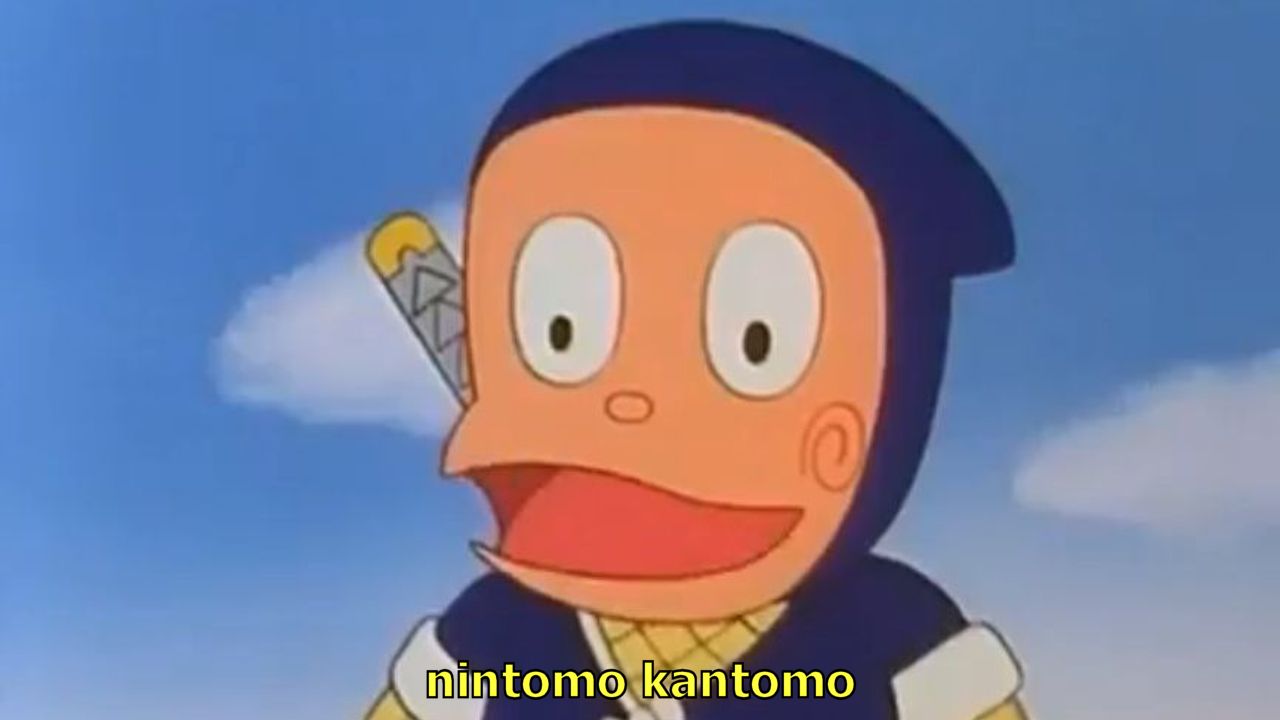
The English version of Super Mario RPG changes this ninja enemy’s line completely to “Wooo HOOO! I’m a FOO!”. I don’t know if there’s any significance behind this new line, but I feel like the rhyming words were inspired by the repetitiveness of the Japanese line and the way that nintomo and kantomo feel rhyme-like too.
Hippopo
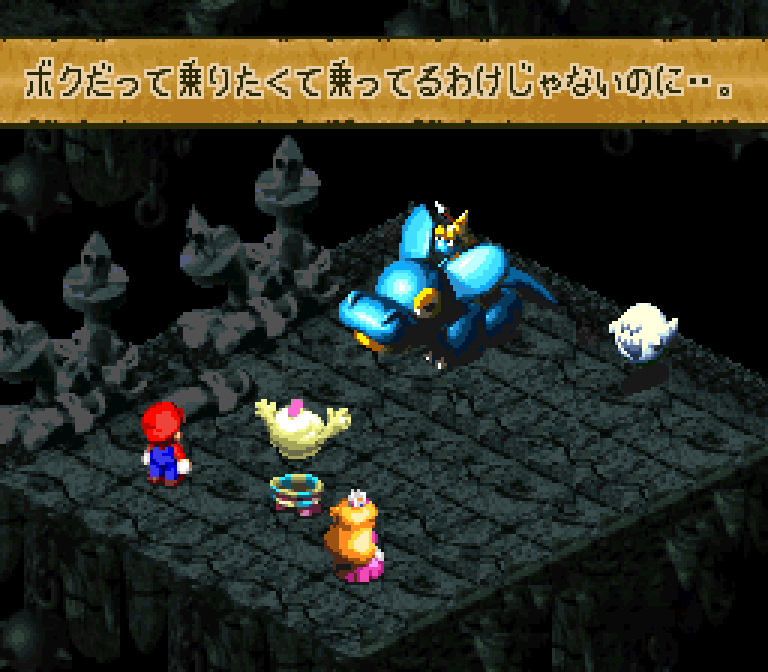 | 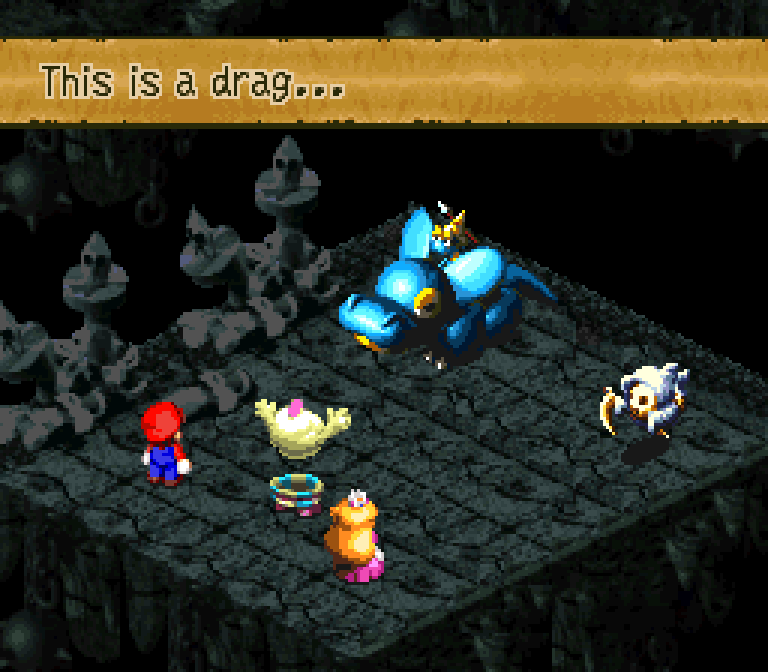 |
| "I'm not piloting it by choice either..." | "This is a drag..." |
Here we have another Japanese enemy message that’s a direct quote from Neon Genesis Evangelion. Throughout the series, Shinji has to pilot a giant mech even though he doesn’t want to. It seems the Super Mario RPG enemy is forced to ride on a giant hippo monster against its will too.

The English version of Super Mario RPG changes the line and drops the reference. The new line is now “This is a drag…”, which appears to be a straightforward translation of the original line, rephrased and condensed down to fit within a limited amount of memory.
Mass-Production (Kenzōru) / Machine-Made (Mack)
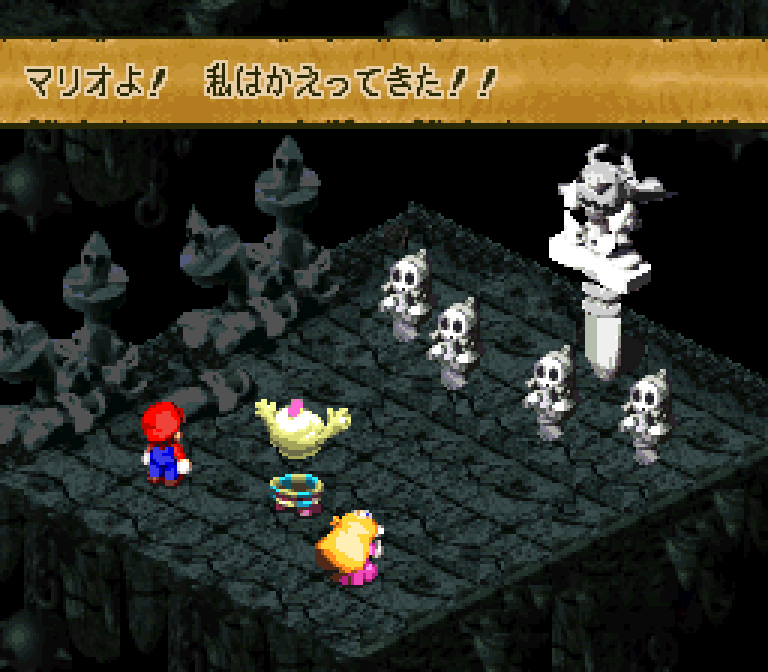 | 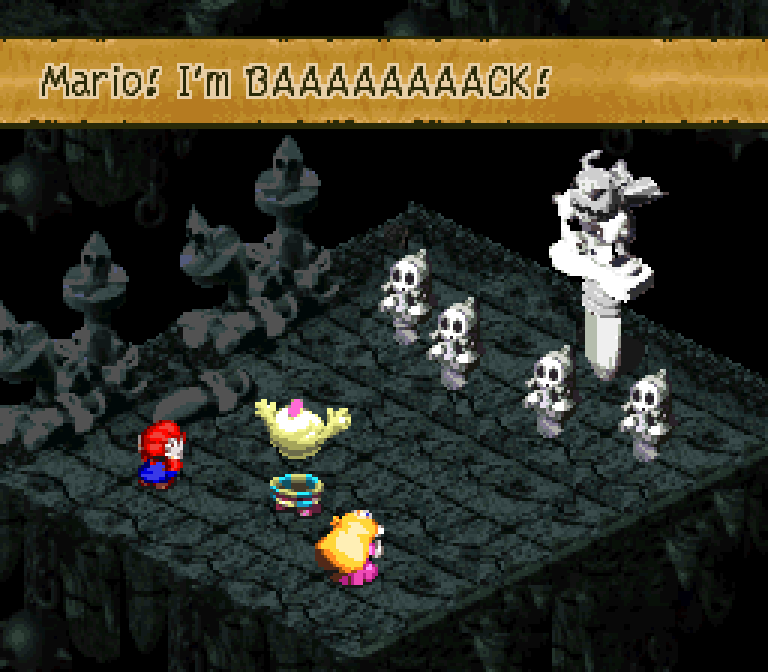 |
| "Mario! I have returned!!" | "Mario! I'm BAAAAAAAACK!" |
Late in the game, previous boss enemies show up again as mass-produced standard enemies.
In Japanese, this mass-produced enemy’s message is another reference to Mobile Suit Gundam 0083 quote. Like before, this quote is said by Anavel Gato during an important battle scene. It does sound pretty generic in translation, but the minute details in the Japanese quote are indeed preserved in the Super Mario RPG line.
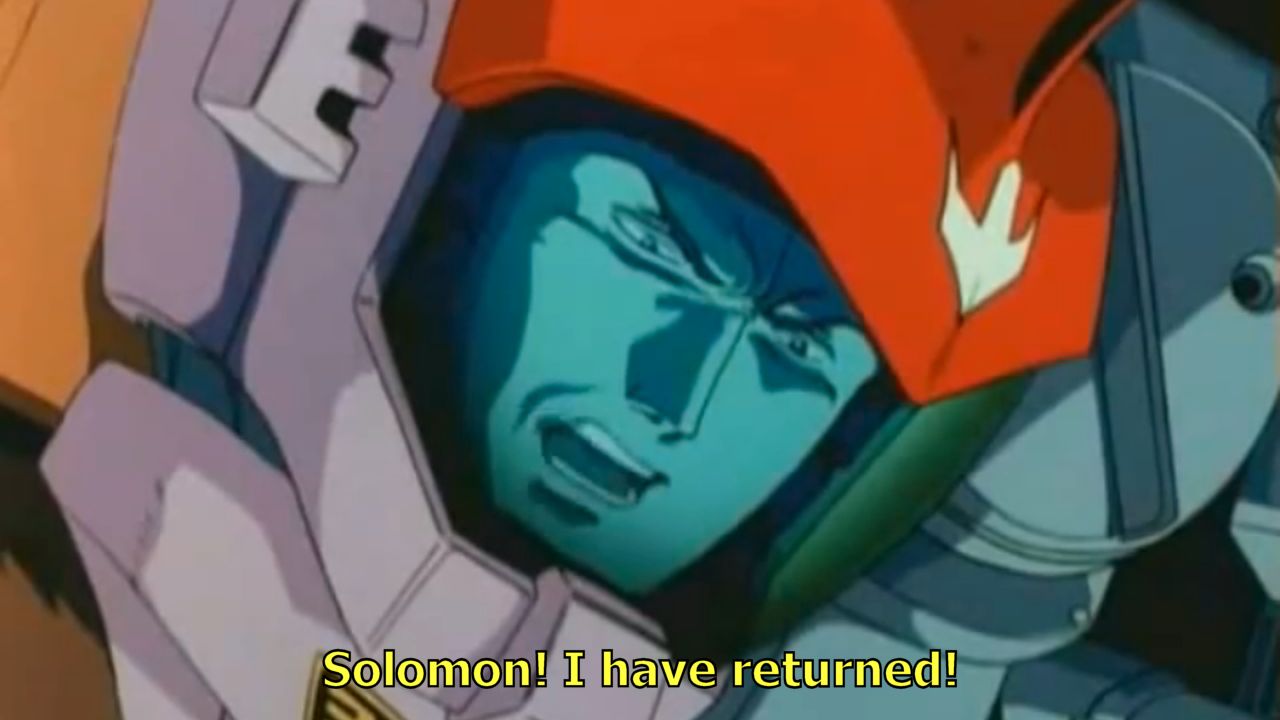
The English version of Super Mario RPG translates the line in a straightforward way: “Mario! I’m BAAAAAAAACK!”. I originally thought this might be a reference to an American movie or something too, but couldn’t quite place it. Then some readers reminded me of the famous “they’re baaaaack” line from Poltergeist II: The Other Side:
I remember that this quote was everywhere around the time Poltergeist II came out, but I never expected to see it in a Nintendo game!
Mēterurinku / Domino
 |  |
| "Blam-blam-blam-blam... WON-DER-FUL♥" | "Sh...sho...shocked!" |
In Japanese, this boss enemy’s message is a reference to the 1981 film Sailor Suit and Machine Gun.
The quote in question occurs during the climax of the movie. After the main character blasts her rivals away with a machine gun, she says kaikan (“a wonderful/pleasurable feeling”) with an enraptured voice. I’m not sure why this Super Mario RPG enemy was given this line, though.
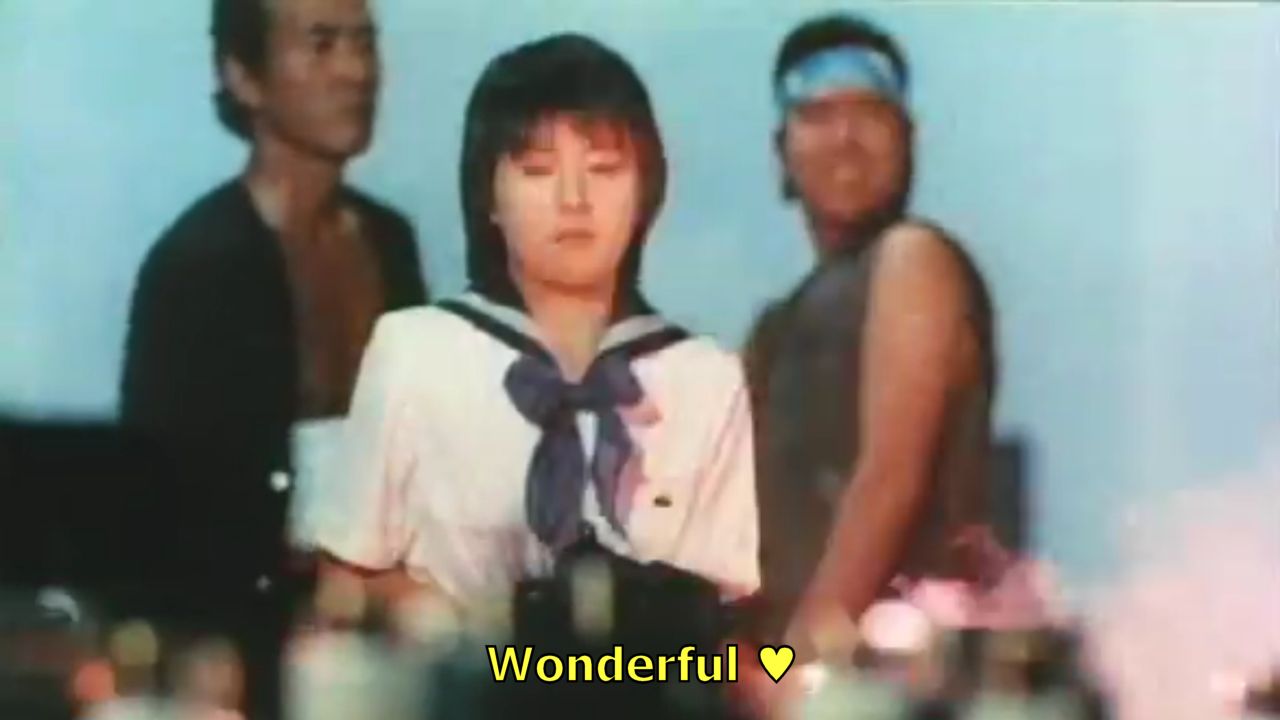
In the English version of Super Mario RPG, this line changed to “Sh…sho…shocked!”. Without context, the sound effect part at the start of the Japanese line could instead be interpreted as a zapping, electrical shock sound. I believe that’s where “Sh…sho…shocked!” comes from. The rest of the text was dropped, as we can see.
Kan / Poundette
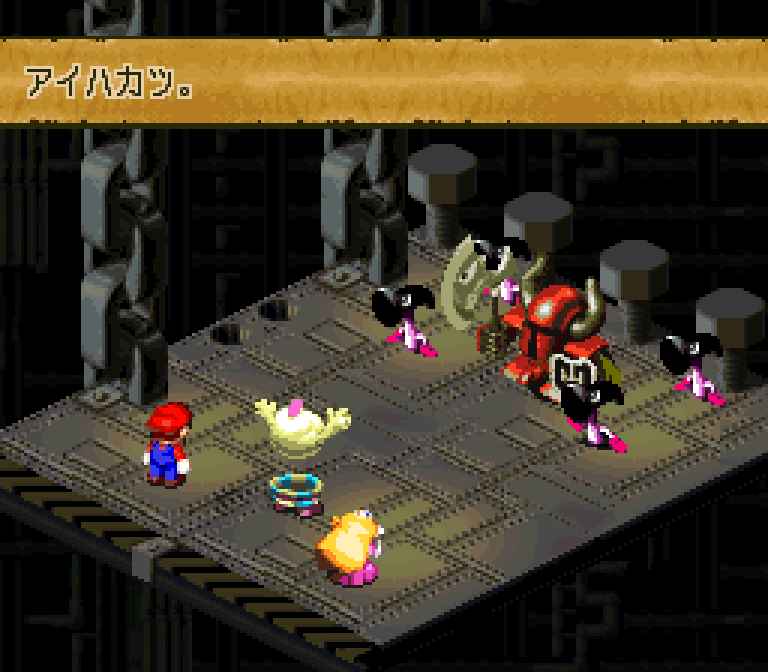 | 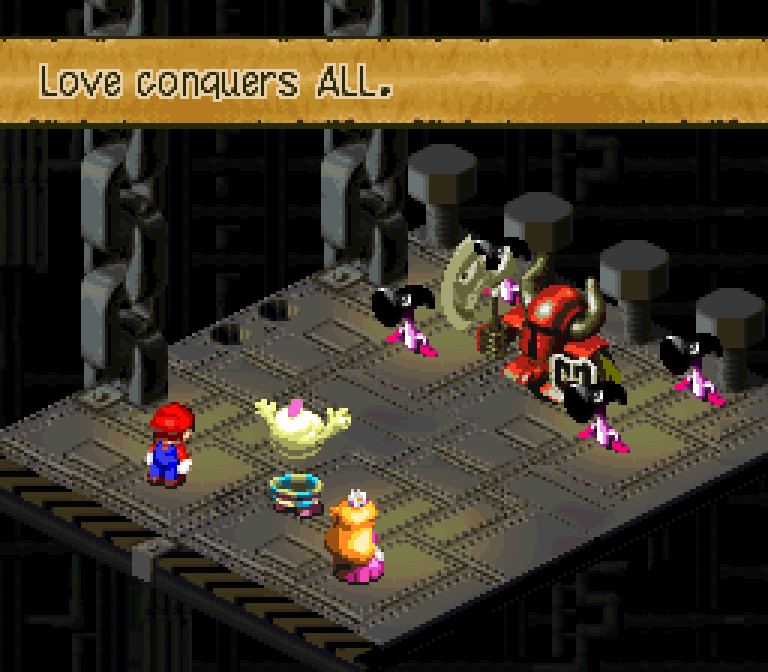 |
| "AI WA KATSU." | "Love conquers ALL." |
This enemy’s Japanese message takes a bit of work to explain.
First, the enemy’s name is “Kan”. In Japanese, kan is a sound effect word for something that’s loudly clanking or banging. And since this enemy is a living hammer, the name fits.
There’s also a Japanese musician named “KAN” who was incredibly popular in the early 1990s for his song, “Ai wa Katsu”, which means “Love Will Win”. The song was a huge success, sold millions of albums, and became one of the representative songs of the early 1990s.
So, because the enemy’s name is so close to the musician’s name, the game’s writers inserted some extra humor by referencing KAN’s “Ai wa Katsu” song.
The English version of Super Mario RPG keeps the basic meaning of the original line intact with “Love conquers ALL.”, but the significance of the line is lost in translation.
Unused Enemy
There’s a bunch of unused enemy data in both versions of the game, and this includes unused enemy quotes. It’s not clear how these lines were originally meant to be used, but there’s at least one unused enemy line that appears to be a Gundam reference in Japanese:
| Japanese Version (basic translation) | English Translation |
| オトコはきらいなんだ めえ~ | I REALLY hate males…! |
The Japanese line means something like “I hate guys!” followed by the sound that sheep and goats make in Japanese. After popping it into Google, this line appears to be based on a quote from the Gundam series, more specifically said by Quess Paraya in Char’s Counterattack.
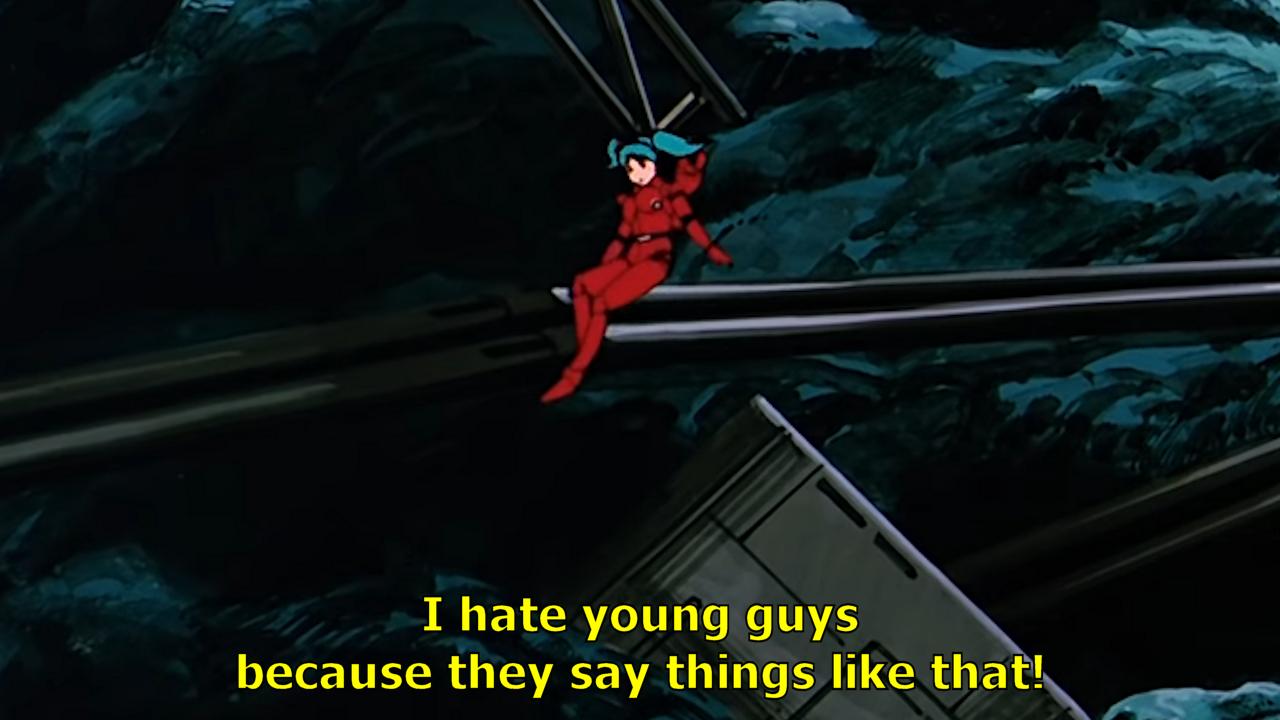
As far as I know, there aren’t any unused sheep or goat enemies in the game, but if anyone knows more about this stuff, let me know.
Some Thoughts
I’ve worked on lots of translations filled with Japanese pop culture references, and I can honestly say they were some of the hardest challenges I’ve ever faced. As a translator, sometimes you’ll get notes and info about pop culture references, but – at least in my experience – a lot of the time it falls entirely on you to recognize them all.
Then, even if you do recognize a reference, there’s still the problem of how to handle it: keep it as-is, try to find an equivalent reference in English, write around the reference, or write something else entirely? That’s an entirely separate challenge that I’ve given a dedicated article of its own.
Anyway, this is all to say that the Super Mario RPG translator faced one of the toughest challenges in the trade, had to work with tight deadlines and limitations, and didn’t have modern Internet access to research any of these pop culture references. Even now, with Google and YouTube and Wikipedia and all that, it took me weeks to track down everything in this article.
Looking back, I can definitely see that Internet growth has changed the translation industry. I can almost hear pre-Internet entertainment translators grumbling things like “in my day, we used to translate uphill both ways”. I guess this is all a good example of why entertainment translators need to study more than just language – they need to study entertainment too, both new and old.
More References?
We’ve only focused on enemy messages in this article, but I’m sure the game’s main script is filled with little references here and there too. It’s also possible that other enemies have subtler references that aren’t as well known. If so, I’d like to cover them someday, but for now I’m just happy I was able to learn so much and discover how wild the Japanese developers got. Hopefully you’ve enjoyed this pop culture bonanza too!
If you enjoyed this article, check out some of my other Super Mario RPG articles here. You might also like my look at how Bubsy was localized into Japanese - it's sort of the reverse of what happened in this article. And then there are all the secret pop culture references hidden in the Japanese version of Zero Wing!



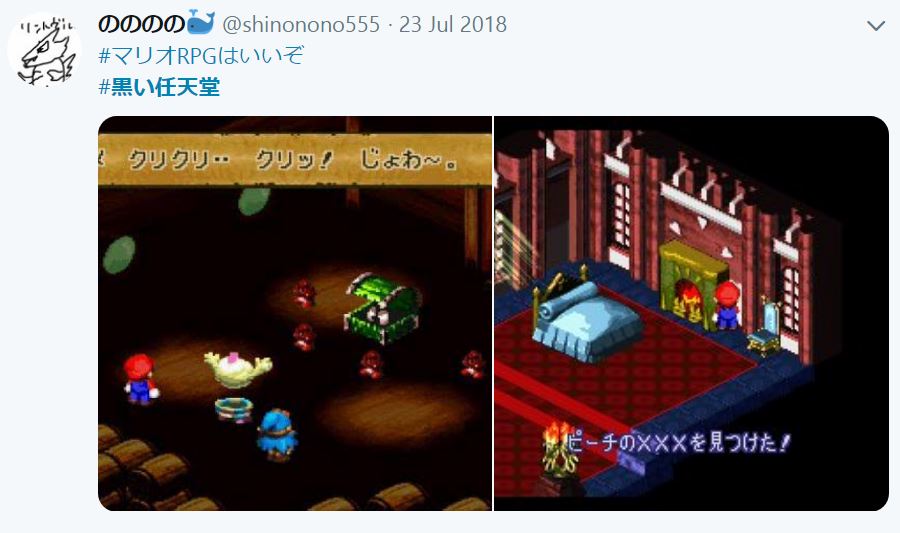
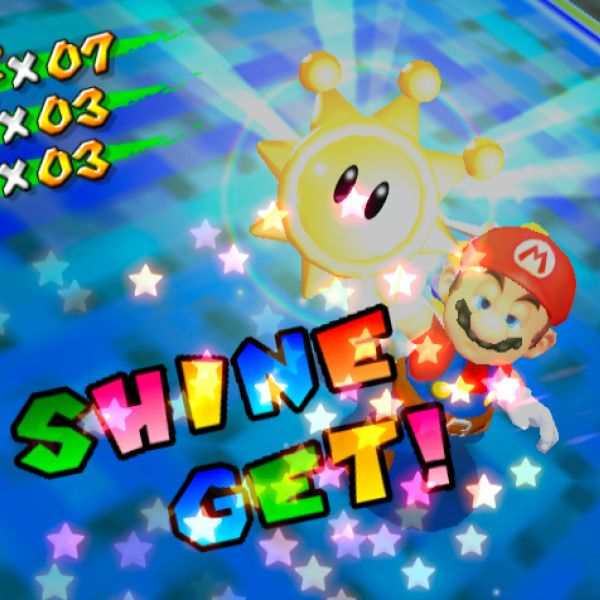
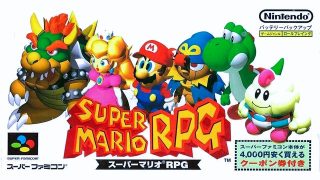
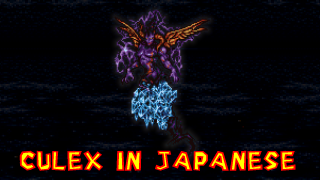
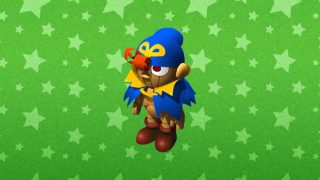
“The English version of Super Mario RPG translates the line in a straightforward way: “Mario! I’m BAAAAAAAACK!”. I originally thought this might be a reference to an American movie or something too, but nothing comes to mind except Independence Day, and that was released after Super Mario RPG.”
My guess is the trailer for Poltergeist II, from 1986: https://www.youtube.com/watch?v=rH-B6A04iK0
Yep, that must’ve been it, thanks! I’ve added the Poltergeist II “They’re baaaaack” thing to the article.
Who has inserted a Metal Gear reference into my Mario game? That said, these psychopath messages are indeed a gold mine. What does the Mario copy created by Belome say? Nothing, as even as a copy, Mario’s still silent as always.
Aw, I was expecting to see Bowyer’s message. You see, in the english version he speaks all Yoda-like, however his Psycopath is spelled perfectly normal. I always wanted to know if this happens on both versions or not.
Yeah, that’s a natural thing to wonder about too. In fact, might as well make an article about how Japan handles the various ‘speech quirks’ and not just give them an Osaka acccent and call it a day either.
In Japanese he ends his sentence with “nya” and uses “nya”-based wordplay, but I don’t recall the significance it has with the character at the moment. Both his dialogue and his thought message use that unique style, though, so I guess the English version added an inconsistency there.
I was waiting for this one, and I gotta say it didn’t disappoint. I wonder if any of the paper mario tattle had any pop culture references too. And I @ you a list of these a while ago did I have any impact on you creating this article (´υ`)
Yep, you gave me the push to finally get the ball rolling, thanks!
Your welcome(^v^), Funny that one of my favorite games references two of my favorite anime Eva and Giant Robo.
About the Crook enemy, it is translated wrong. You can run away from the enemy, and the point is that the enemy frequently runs away from you.
Cool, thanks for the confirmation!
Well worth the wait. Great article.
So for that hammer enemy, it would’ve been the perfect opportunity for it to just say “STOP!”
HAMMER TIME!
“in the name of love” see we’re just looping back here.
The Hammer Bros use a special attack called “Hammer Time”, though, so that reference was made. (It’s strange that some enemy skills ended up with names that were more appropriate than those enemies’ Psychopath quotes, since there isn’t a one-to-one relationship between enemies and skills like there is with Psychopath quotes.)
I think it would be funny if their localized quote was “I’ll hammer out danger! I’ll hammer out warning!” That would probably be too long, though.
You might think one Hammer Bro could say “I’ll hammer out danger!” and the other could say “I’ll hammer out warning!”, but the game counts them as two copies of the same enemy, so that would only work if you added another enemy type to the game data that had the same spriteset and all the same stats as the first Hammer Bro, but a different Psychopath quote. So, probably more effort than it would be worth for an enemy you shouldn’t even be able to use Psychopath on anyway.
(Working Designs actually made changes to things like enemy definitions to address perceived balance issues in a lot of the games they released, but the results were mixed, it backfired hard in at least one case, and that was not something that localization teams usually tried to mess with in the 90s.)
“It’s clear that the translator understood the Japanese text, but didn’t understand the significance of the line.”
Which frankly seems to be the running theme in SMRPG’s translation. Even basic Mario series stuff isn’t recognized.
Amusing that the line about sympathy has retroactively become a pop-culture reference during the Wii era after Ike’s brawl line about “You’ll get no sympathy from me” (which doesn’t really fit his character) was memed up. “I’m not dead yet” is a completely different, but still fitting, pop culture reference in English too. May have been left like that if not for NoA’s policy on death.
Yeah, now that I think about it, an article about the Mario-specific elements that were changed/missed in translation would be pretty fun.
Big Boo being just an ordinary Boo comes to mind. And then there’s Yo’ster Isle which is in fact the original Japanese name for Yoshi’s Island.
The issue is that despite being published by Nintendo of America, the game was actually translated by Square. Which, being a post-FF2 SNES Square game, means they likely gave Ted Woolsey a printout of the script and an eight-week deadline. Ol’ Ted probably didn’t have access to whatever localization bible Nintendo had at the time (and Mario games were not very text-heavy yet; you could probably write every word in Super Mario World on one sheet of letter paper and have room on the back to write everything in Yoshi’s Island). So things like “Yo’ster Island” and “NokNok Shell” slipped through because he was translating the names from scratch. Woolsey presumably knew what a Koopa Troopa was called, but that doesn’t mean he knows that a “ノコノコ” is what they’re called in Japanese!
Goku says オッス, not ウス, so it’s not a straight quote.
I definitely recognized “Tsun tsuku tsuku tsuku tsu~~n”, cuz the manga Dr. Slump made the exact same joke.
Also, that squirting bean joke? All I can say is just WTF.
Here’s an image of the manga: https://imgur.com/a/dLia6fj
Oh! Thank you! No wonder it was so familiar.
“Strike the pose”
The localizers accidental made a completely different JoJo reference.
Even if the translators did know these references, I don’t know how they’d expect kids in the U.S. to know any of them at all. For starters, anime only really started to take off in the States after 1997. And of course, let’s not forget the helicopter parents who were super paranoid about foreign stuff.
Honestly, the translator should’ve just been passed a note that read “These are all random pop culture references. Feel free to replace them with american pop culture references. Except this one is a Power Rangers joke. It is 1995 and you should probably know the Power Rangers. Oh, and this one’s a Mario reference. You know, Mario?”
I played in Japanese, reading an American FAQ when I needed a little help, and the translator definitely didn’t know Mario terminology. One of several examples was Yostar Island, which was Yoshi’s Island in US Mario World. I have no idea why they didn’t at least give him Japanese and us manuals from all prior Mario Gant’s so he could check.
Correction: That’s Jonathan Joestar, not Joseph.
Thanks, I’ve fixed it. It turns out I was mixing up the two different battles that involve the “beat of blood” and “beat of Hamon/ripple”. I shoulda known Joseph wouldn’t be wearing a bowtie too, haha
I’ve been curious for a while about the Japanese enemy thoughts, so this was an interesting read. Never would’ve guessed SMRPG would have so many Eva references. I guess it’s because it was pretty recent at the time? Going by the number of Gundam references as well, maybe whoever on the staff wrote the enemy thoughts was a mecha anime fan…
When I got up this morning I had no idea I was going to learn about Giant Robo references in this game. Whoever put that in has excellent taste and lots of patience.
The “Shikashikashika!” thing might possibly be referencing the song “Oh Yeah,” by Yello: https://youtu.be/6jJkdRaa04g?t=43
Other than that, I feel like this article should be mandatory reading for anyone who complains about pop culture references in the English version of games on principal (as opposed to in particular).
I’m entirely in agreement; “Oh Yeah” was the very thing that came to mind when reading that quote.
I feel like, in addition to it being incredibly difficult to translate these kinds of jokes, the Psychopath messages were probably pretty low priority text. It’d be hard to say what kind of access they had to script context but you probably wouldn’t spend a lot of time editing these weird contextless lines, and you might spend even less if you knew they were such a small part of the game, you were on a deadline and you had text players were much more likely to see and need to be able to understand that you could be spending that time polishing.
For some reason… I think the translator actually did understand the Jojo reference.
Loved the article, it was VERY thorough!! One thing, though. 10nen hayai is not a reference from Virtua Fighter, the phrase seems to have come from way back (the first link that appeared on google was this: http://yorei.seesaa.net/article/2729475.html). I’ve only seen it being used in regards to martial arts and martial artists, so there’s that.
Anyway, great work, keep it up!!
It’s surprising that there would be Evangelion references in SMRPG, considering that the game was released in Japan mere weeks before Eva would first air its final televised episode. (Putting it in perspective, SMRPG was released in the same week as Evangelion’s 23rd episode, meaning about a week before Kaworu Nagisa’s introduction episode). Wonder how late in development the game was in before it was decided to add Mallow’s Psychopath ability (or at least the Eva lines in question)
It’s a minor thing, but as far as Gundam goes, it’s usually written in English as Zeon, not Zion.
Gundam names are a whole topic in itself. Zeon was often taken by localization very early to avoid conflating it with Zionism, but all the way up to the nineties, “Chikyuu Renpou” was often given as “United Nations” in the original versions. Take a very close look at the Gundam Alex’s shoulder in this picture:
https://vignette.wikia.nocookie.net/gundam/images/1/1a/RX-78NT-1.jpg/revision/latest?cb=20121104121329
I think the Jackie 2nd Form’s line, “Sympathy? Not from me!” might be a Sympathy for the Devil reference. So yeah.
“I don’t recall if the word “sexy” was a problem for Nintendo of America at the time”
EarthBound used it twice! “The Runaway Five are so sexy!” and [before Venus’ show] “Ow! …You cute, sexy thing, you!”. But you should know that, you wrote a whole book on that game. 😉
Love is a fried cutlet.
Whoa, it’s AmzRigh! Hi!!
Hey Poe 😀
So good to see your lovely names, great article mato. 🙂
Dang, it’s been a long time, good to see/read you again!
Dole Washer!!! Hello 😀
Aikatsu?
愛はカツ
アイカツのアイは「愛情」の愛
These examples are actually really sad, because not only have all the pop culture references been lost in the English localization of the game, but all the original Japanese lines are perfectly suited to the characters and the situations they appear in in a way that isn’t retained in the English version.
Some of the English lines still fit with the characters, like Czar Dragon saying “Hey! We’re not done yet!” after he comes back as a skeleton, but most of them either sound like attempts at LOLRANDOM humor, have an entirely inappropriate tone (like Boomer just sounding despondent instead of stoic and professional; even playing this game as a kid, that whole scene seemed out of place to me because it’s such a depressing interlude that shows up in the middle of a light-hearted story and doesn’t even connect to anything else that happens,) or imply incorrect information about the characters, like the way Kamek ends up saying he had a child in the past instead of saying that Mario was the baby he’d seen in the past because the Japanese line doesn’t use any pronouns that might provide context. (Since a lot of enemies in Bowser’s Keep have special scripting that makes them run away if Bowser is in your party, the first time I played through that part of the game, I thought Kamek was scripted to react when you fought him with Bowser in your party as well, and his Psychopath quote was supposed to mean that Bowser was Kamek’s son who had been separated from him since the events of Yoshi’s Island!) It’s obvious that the translators were just working with a text dump of all the Psychopath quotes, without knowing which enemy says each quote or what context each enemy appears in.
It’s strange that the translator correctly recognized Jinx’ “you’re 10 years too early” line as an idiom that’s supposed to be interpreted as “you don’t have the experience to compete with me”, but when Croco uses the exact same idiom near the beginning of the game (when you have to chase him around the maze in Bandit’s Way,) it’s translated literally. (There’s a funny touch there, which is that Croco repeats the same line every time you catch up to him, with a smaller number of years too early each time, so maybe the translator just couldn’t think of a similar phrase in English which included a number that could be counted down?)
Also, I find it interesting that the message for the third battle with Jinx spans two text boxes, because I don’t think there’s any Psychopath message that does that in the English version of the game, and I didn’t know the game’s programming allowed them to do that (although, realistically, Psychopath probably just calls the same function that’s used to display the text boxes for scripted dialogue during battles, and some of those dialogues go on for quite a number of text boxes, like the argument between Chef Torte and his apprentice, or Culex’ monologue at the beginning of the battle with him.) A lot of enemies probably could have been given more appropriate quotes if that feature had been used.
Honestly, I’d say the biggest translation mistake here, and perhaps the biggest translation mistake in the game as a whole, is the name of the skill being translated as “Psychopath”. Admittedly, the Japanese name of that skill (なにかんがえてるの) is kind of the odd one out among all the skills, because it’s the only one that’s an actual sentence that a person could say in a real conversation, so I could see some confusion happening about how to translate it, especially when the translation has to fit into a 12-character field, but “Psychopath” has entirely the wrong connotations for what the skill actually does (and for Mallow’s character, for that matter.) Were they trying to make a pun on “telepathy”, with “psycho” dropped in because it’s a psychic power, and they just forgot that “psychopath” is already a word that means something completely different? Was the thinking behind it that psychopaths are good at getting inside people’s heads to manipulate them, so “psychopath” would be an appropriate name for a skill that lets you see what’s going on inside the enemies’ heads?
I think a better alternative would have been to call the skill “Whisperwind”, which would both fit into the same weather theme that all the rest of Mallow’s skills have, and fit with the concept of the skill, which is that it tells you secret information about an enemy. Or it could even be called something like “Telepuffy”, which would be more obviously a pun on “telepathy”, and would make a reference to Mallow’s appearance.
I always thought that the Magikoopa’s “That’s…my child?” was a reference to the monsters he summoned.
Actually, Booster’s Psycopath message when you fight him (if you lose the Hide ‘n Seek mini-game three times) is something like “This is like realising you’re outside without your clothes on”. Since that doesn’t fit in just one box, the sentence appears split up in two (I remember it because the first time I saw it I thought it was very weird).
Telepuffy would have been absolutely perfect. It sounds like something that would be in league with the pun-laden humor of later Mario RPGs. Good one!
Regarding text over multiple boxes, it certainly would’ve helped the disclaimer gag on Guerilla come through pretty much intact. Heck, given how wordy legal documents are in English, it could arguably amplify the joke if it’s the only one that goes on for more than one or two lines.
That said, while the displaying of the message almost certainly calls the same function as things like the Culex’s monologue, there might be file/string size limitations on Psycopath messages in particular that would make them difficult or impossible to expand like that.
I think the Magikoopa one makes a bit more sense if Bowser is in your party at the time. If so, it can be taken as a reference to him, and Baby Bowser’s role in Yoshi’s Island in general.
Still, it’s interesting to see how much more relevant the translations seem to be for modern stuff like this. I mean, as you said, Mario RPG was done in a time where the internet wasn’t in the same state as it is now, and researching the cultural/contextual meaning of a character’s name or lines was significantly more difficult. There are loads of places where you could tell the translators struggled to understand whether an enemy was based on one from an earlier Mario game or what not that would have been avoided had it been done now.
(Goombette instead of Mini Goomba, the Big Boo in general, Sky Troopa instead of Paratroopa, Goby instead of Cheep Cheep, etc).
Contrast this to modern Mario & Luigi and Paper Mario games, where the original meaning is kept intact as much as possible and context is carried over between translations, and well, things have definitely improved there.
A more obscure one: Shy Away instead of Beezo.
I dunno if anyone has mentioned it in the comments but omame kurikuri jowaa can be interpreted as “rubbing cl*toris, squirt” which explains the Japanese gamers’ reactions.
I think there’s a subtle implication there that comes from the fact that an honorific is used with the word “bean” (that is, it’s written as 「おマメ」 instead of just 「マメ」.)
In Japanese, some traditional foods are normally referred to with an honorific regardless of the context in which they’re being mentioned, like お寿司 (osushi) and お菓子 (okashi/candy,) but 豆 (mame/beans) is not one of those foods. However, that type of honorific is also commonly used when referring to someone else’s possessions as a sign of respect to them, which means that 「おマメ」 can easily be interpreted as “your bean” instead of just “beans”. It’s an unusual use of an honorific that implies something is going on besides just a bean talking about being a bean.
(It’s strange that the word “bean” as slang for “clitoris” just happens to exist in both English and Japanese, but I suppose that makes it easier to explain the double entendre on an English-language website.)
My knowledge of Japanese is not as advanced as many here but I twigged to the potential this is a TRIPLE entendre around “kuri” and that clarified the meaning, it reminded me a lot of the infamous “chestnuts and squirrels” pun.
Given that the shadowy monster made a reference to side profiles, I think the translator missed a chance to make an Alfred Hitchcock reference.
This is probably redundant if you’ve watched Mato’s streamed videos of Super Mario RPG, but I was searching for something related to this, and I found a Reddit post where someone actually laid out the Japanese and English names of every enemy in the game, along with commentary on some of the cultural references in the Japanese names and the apparent logic behind some of the localization choices. It’s interesting stuff.
Actually, the phrase “you are ten years to early” is not a reference to Virtua Fighter, it is just a common japanese phrase. You basically find that in almost any fighting anime.
for the Rat Funk/Chutaro one, I’m pretty sure the translator went with “squeek squeek” was because the “chu” of the Chutaro is pretty much the Japanese onomatopoeia for “squeak”
the Mamekuribō / Goombette one, I’m almost positive the Japanese reference is of the Yokai known as the Azukiarai, who used to freak out passers-by with their bean-washing… Gaijin Goombah brought this up in his video “The Anime That Called Out YouTubers! – Culture Shock”… I’m almost certain Japanese kids today are unaware of those legends as it fell into obscurity and likely nowadays take the quote as something sexually suggestive instead
the Ninja-kun / Ninja english version with “I’m a FOO!”… MIGHT be a reference to Foo Fighters… so theoretically, you’re the ones fighting a guy who calls himself a Foo
About the Power Rangers, they couldn’t just summon the giant robot. I can’t remember the exact line but Zordon says something about how they can’t escalate the fight which made them reactionary to the monsters. They can’t use the giant robot until the monster got big.
In Zyuranger, the robots were actually alive so they could refuse to appear whenever the wanted.
The main robot in Zyuranger was actually a god. Come to think of it, I’m STILL not sure why the rangers were even needed to control another living being, let alone a deity.
My favorite joke in SMRPG was 8ビート. A bee enemy whose name contains hachi (means eight and bee in Japanese,) bee in English and sounds like 8 bit.
I have been secretly working, for about half a year now, on a near-complete overhaul Rom Hack improvement for Super Mario RPG that updates as much as humanly possible about the game up to the standards of a current Nintendo released product in terms of writing, as well as many other changes like graphics, menus, translation, enemy names and so on…. and there are actually a few things that I learned reading this about these lines that really helped me. (Mostly, deciphering some of these references I didn’t know already)
So thanks, this actually helps me out quite a bit.
Seems even the Japanese aren’t above putting pop culture (well their pop culture, anyway) references in RPGs.
Speculative theory about ‘It’s a melee!’ — SMRPG came out shortly before SM64, which famously had Mario say ‘It’s-a me!’
The fact that they *did* release in that order makes this one unlikely, but anyway…
Heh, I can’t believe I missed that Gecko reference to Luigi! When I played this game way back when, I thought the “Red what about green??” was a callback to the first version of the enemy you encountered earlier, which was reddish orange color.
At the time, I also thought Magikoopa’s “that’s my child?” line was a reference to Bowser, in the sense that Kameck was portrayed as Baby Bowser’s guardian in SMW2, and thus thought of him as his child.
In regards to the Ninja, is a “foo” anything?
your comment reminded me of how they used to use “foo” for a lot of asian/martial arts stuff baack in the 90s and 80s
like, fumanchu, hong kong phooey, pato fu……
and about kamek’s line, bowser is not at the party at that moment so that can’t be it…
I think the translator was having fun implying that he looks like mallow, and since mallow’s story is a quest for its parents it kind of fit.
I’m playing through Mario RPG and the crook fight really doesn’t let you run away, at least in the american version but he has a tendency to run away pretty often.
I think a couple of the american translations DID get the joke in the original but the phrases are so generic in english it’d be almost impossible to pinpoint what were they referring to, for example Crusty sounds like the kind of line you’d hear from an informercial, so the translator did understand the meaning behind it.
same with the jojo reference in Buzzer, the main thing about jojo is posing ( jojoposing was even a meme for a while ), so again, I think they were familiar with the source material and adapted it the best they could given space limitations and localization.
Poundette seems to be referencing Love conquers all from deep purple or abc, there is still a reference in the enemy name but it’s not so direct
both bands are from england, and I think the translator used the pound to indicate that. it’s more convoluted than the original but the intention seems to be there.
with forkies, isn’t the joke that tsu and shi look a lot alike? i assume it’s a joke because he made the ku into kas too. he didn’t get the original context so he turned it into a translation joke.
also if you say it fast it sounds like “shitshitshitshit”, like a panicked reaction to the design possibly being interpreted as.. you know.
i’m sure a lot of others weren’t SO generic at the time, but with the massive amount of 80s and 90s media that was just buried by the passage of time it’s hard to tell….
and that’s that
take care and stay safe!
( sorry if my comment is kind of messy or weird, i’m usually nervous when commenting )
Hello, Mato. I’m not sure if you’ll be reading a comment on a years’-old article, but at the time of writing, I’m in the final passthrough of a (with any luck) “Slattery”/Advance-style Super Mario RPG translation overhaul that I’ve been working on and off since 2018. I know an undertaking like that has very high expectations, so I sincerely hope that I’ll have done one of my childhood favorites justice, and I thank you for the passionate video series that inspired this endeavor. I’ve recently reread this article as the pop culture references were low priority for me, and to be honest, I’m not sure if I’ll be able to fit them all, but I was hoping you’d clarify a few things for me. Is Belome’s dialog in general based on the TV show alluded to in his thought? I notice that he has several catchphrases and quicky mannerisms that were written out of the English release. I think I have a feel for this character, but to be clear, if he’s a big reference to this TV show, how would you describe that character? Additionally, are there any other cultural references you’ve spotting since writing this article that come to mind? Pepput / Punchinello seems to me like another reference to something, but I’m not sure. (Also the bee enemy in the article is Hachi Bīto Red / Stinger, not Hachi Bīto / Buzzer.) Thank you in advance, and thanks again for your Super Mario RPG series.
You might be on to the Punchinello connection, since the conceptual artwork on TCRF shows him paired with Belome during development. If he seems a bit funny in the final, it could be a remnant of when they were buddies. Check the pre-release article. By the way, does this have anything to do with the recent “reworked text enhancements” released for the game’s 25th anniversary?
That “reworked text enhancements” was my doing, actually. Completely unrelated to LiThL’s hack. In fact, I only made that patch because I thought nobody else was interested. And I didn’t have the game’s 25th anniversary in mind, that was just a coincidence. Regardless, that hack was hot garbage, and I’m glad I managed to scrub it off the face of the internet.
Funny how the JoJo reference became “STRIKE A POSE” and then posing became what JoJo’s largely known for.
Watching Family Guy is cringe, bro.
I feel Magikoopa’s line still keeps the context rather well with Yoshi’s Island. At this point of the game you’re expected to use Bowser since he’s got an exclusive ability to scare off enemies as well as to let him get his castle back from the enemy. Since he’s likely to be in the party, the mind controlled Magikoopa could be recognizing Bowser, saying “That’s my… Child?”
some of you sound like you never played a game in you’re life. the u.s.a is famous for butchering game translations such as ff4’s goofy script (compared to what was actually said in the japanese version). my point is you expect the u.s.a translater for mario rpg to translate it exactly how the japanese game was story wise…..but even if he knew what the japanese meant it doesnt mean the u.s.a crowd would know and of course when they bring games over to the u.s from japan its to please the u.s audience such as games with high difficulty in japan that difficulty is set to “easy”.
so im not surprised a complicated/long drawn out philosophical story/reference is shrunk to simple baby talk that even the u.s person is like “oh ya i get that”. I think some translaters do butcher terms because they just dont know what the japanese meant but even a very well trained translater has probably changed some terms due to cultural reasons such as not making sense in the u.s.
like someone mentioned anime was not so big back then which is what most of the reference’s are from. do you know what was around in 1995? I didnt know 1 person who owned a pc or had internet at the time. anime was on vhs tapes with subtitles. literally baby’ing the u.s audience. Everything was simplified when brought over to the u.s leaving out blood etc..
So im glad rpg games came out with changed/butchered translations because if there was a jojo/neon genesis reference i would not have got it and i watched more anime than anyone i know but even i hadnt heard or seen those 2 anime before. so you can only imagine a regular kid who didnt watch anime how lost they woulda been playing the game which is story based. Square did an amazing job with what they had to work with. deadlines, space constraints in games etc..